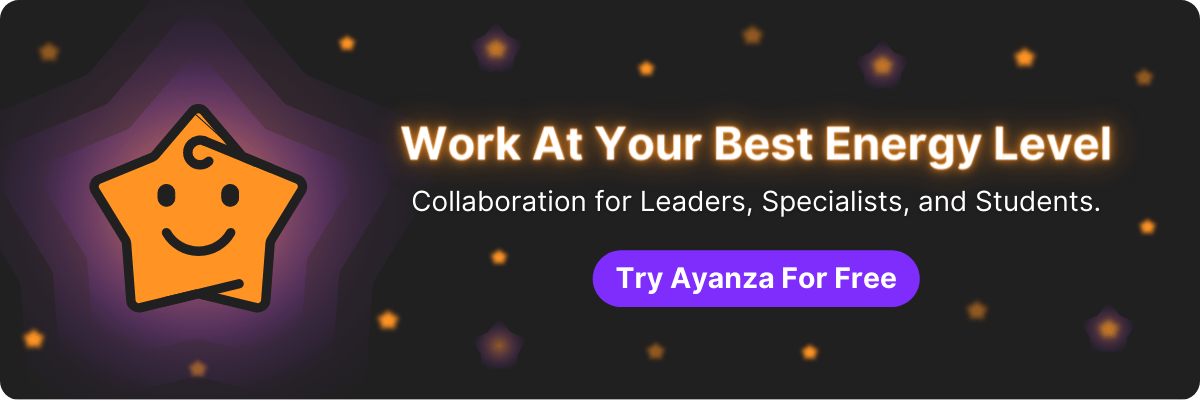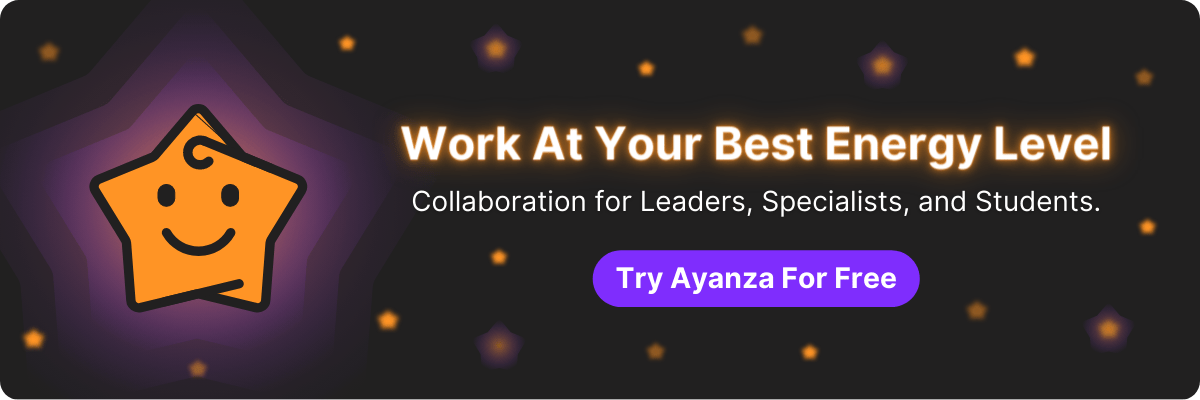

25 Best AI Chatbots in 2024
AI chatbots have revolutionized how modern companies conduct business and interact with customers. More importantly, they’ve paved the way for the unstoppable expansion of artificial intelligence technologies.
AI chatbots support many use cases, such as customer service and support,AI project management, idea brainstorming, content planning, data harvesting, and even chatbot building. They empower business organizations to provide 24/7 customer support at any scale while saving time, effort, and resources that teams can use to handle more human-centric conversations.
With access to AI technologies like machine learning and natural language processing, AI-powered chatbot technology can mimic a human-like conversation, answer customers’ questions in multiple languages, provide content recommendations, handle daily contact center tasks, and more.
Conversational chatbots play a critical role in delivering exceptional customer experiences to each consumer and routing customer queries to human agents when necessary. Let’s delve deeper into AI chatbot software and the things it can do.
The best AI chatbots
Here, you can find our carefully curated list of the top 25 providers of useful AI chatbots.
Top 25 providers of useful AI chatbots:
- Ayanza – Best all-in-one AI content creation powerhouse
- Google Bard – Best for brainstorming ideas
- ChatGPT – Best for customer support
- Zapier AI Chatbot – Best for building conversational chatbots
- Bing Chat – Best for content planning
- Perplexity – Best for accessing web data
- YouChat – Best for AI-generated content marketing
- Jasper – Best for sales and social media marketing
- Zendesk – Best for self-service and customer support
- HuggingChat – Best for writing essays and summaries
- Chat by Copy.ai – Best for copywriting
- ChatSonic – Best for large-scale content production
- OpenAI playground – Best for automated testing and email management
- GitHub Copilot – Best for coding suggestions
- ProProfs – Best for customer service
- HubSpot – Best for CRM and marketing
- Zoom Virtual Agent – Best for contact center management
- Freshchat – Best for omnichannel customer service
- ChatSpot – Best for marketing and sales assistance
- Boost.ai – Best for building virtual agents
- Forethought – Best for customer support optimization
- Thankful – Best for email support and customer service
- Zowie – Best for customer service automation
- Dixa – Best for automating customer service queries
- Certainly – Best for boosting e-commerce efficiencies
What are AI chatbots?
Artificial intelligence chatbots use the power of AI and chatbot technology to mimic human-like interactions. They rely on an NLP and ML-powered language model to understand speech context and provide adequate replies.
How do AI chatbots work?
AI chatbots use the power of AI to leverage NLP and ML algorithms, CRM scripts, and service interactions that allow them to understand customer requests and improve customer support responsiveness across multiple communication channels.
The AI technology empowers custom AI-powered chatbots to deliver exceptional conversational experience with each interaction. These intelligent chatbots are customer-facing tools that welcome, engage, and provide consumers with adequate answers to common questions.
Since each contact center deals with repetitive questions, AI chatbots can handle these regular-day tasks to free agent time for addressing more important issues. However, they can do so much more than answer simple questions.
AI chatbots can provide instant, customer-centric responses 24/7 by accessing the conversation history of each client or handle sudden bursts of conversation by fetching information from available web-based data sources.
In addition, intelligent bots can forward important conversations that require human touch to live agents to improve customer engagement and increase satisfaction. They keep contact center agents up to date with all ongoing conversations to ensure they don’t miss crucial customer queries.
AI chatbots are also excellent tools for collecting customer information and gathering it into a centralized database to make contextual data always accessible to live agents. AI chatbots like Google Bard and ChatGPT use AI, ML, and NLP to power a large language model.
These models support various applications, ranging from project management, content production, content writing, and handling customer interactions to public service, collection of image generation, etc. Now, let’s see how these chatbots use the power of AI to gather, analyze, and process vast amounts of data to generate actionable insights.
Chatbots rely on two AI technologies – machine learning (ML) and natural language processing (NLP). ML enables bots to gather data, learn from it, and become more experienced in assisting humans. On the other hand, NLP allows bots to understand the deeper meaning behind customer inquiries, including abbreviations, typos, and slang.
Powered by such immense capabilities, AI chatbots can perform several vital tasks for customer engagement and satisfaction, such as:
- Understand the context behind customer queries;
- Provide contextual support for a customer ticket;
- Assist a customer by providing adequate help center recommendations;
- Gather data from customer interactions to improve customer service replies;
- Provide additional context for contact center agents.
The best way to make your AI chatbots as effective as possible is to train them using customer interactions, such as the ones saved in your CRM software solution.
Key features of an effective AI chatbot
Since AI chatbots are mainly conversational tools, their purpose is to make your customer service, support, and contact center efforts as efficient as possible. They streamline all customer-related tasks to reduce the time your agents spend on handling mundane tasks.
They also help ensure your target audience receives exceptional customer support, which is paramount for delivering a fresh user experience with each interaction. With that in mind, here are the key features to look for in an AI chatbot.
Bot-building functionality
AI chatbots can help you build better bots to ensure unprecedented customer service with no advanced coding knowledge needed. However, using this functionality requires the assistance of developers, so it all comes down to your particular business applications, needs, and resources.
A bot builder can help you do many things:
- Create customer-facing touchpoints for handling inbound support tickets;
- Resolve support queries that don’t require specialized service;
- Streamline various internal workflows;
- Triage support queries;
- Create premade response templates to provide instant responses to customer FAQs;
- Send automated content suggestions and product recommendations;
- Discern prospect intent.
In addition, AI bot builders can also train your AI model to accurately address general-purpose questions and process communication to gather conversation metrics for analysis.
Omnichannel messaging
An omnichannel AI-powered bot empowers your customer support and sales teams to deliver exceptional service and customer experience across multiple communication channels, such as social media, your e-commerce website, phone, email, and SMS.
An AI chatbot will tap into all available customer data, including previous purchases, order history, and spending habits, to facilitate pleasing, relevant, and accurate conversations. That’s how an AI chatbot can help your customer support team resolve issues in seconds.
In addition, an omnichannel AI chatbot can handle and forward tickets if it can’t handle a request on its own. You can use omnichannel chatbot deployment to deliver a consistent experience to every customer, streamline customer service and support, and enable cross-platform collaboration with a unified customer view and always accessible data.
Third-party integrations
AI chatbots support various third-party integrations to access customer data, such as:
- Purchasing history;
- Customer tracking;
- Order details;
- Payment history;
- User IDs;
- Support ticket updates;
- Contact data.
These integrations allow AI chatbots to feed relevant data to every conversation. When a prospect sends a request to your bot, it will provide guidance on a preferred channel and deliver a relevant reply based on their query. In addition, AI bots can combine generative AI functionalities to build more customer-centric experiences.
Smart routing
AI bots use smart routing capabilities to:
- Assess conversation priority;
- Determine urgency based on ticket capacity;
- Ascertain activity status;
- Evaluate agent skills and route support requests accordingly.
These capabilities empower your AI bot to run a ticket, forward it to the most skilled and experienced person for the job, and tap into omnichannel routing to enhance routing rules. Put simply, AI bots solve customer queries based on quality rather than quantity.
NLP-powered learning
NLP-powered training is at the core of an effective AI chatbot. An NLP-trained chatbot is predictive, intuitive, data-driven, and customer-centric. It is sophisticated, personalized, capable, and advanced enough to become contextually aware.
The best examples are Amazon’s Alexa and Apple’s Siri. Both rule-based chatbots can operate as your virtual assistant and use predictive analytics and intelligence to deliver personalized responses based on user output.
Conversational AI
Modern-day online shoppers interact with digital businesses via available online channels. They seamlessly switch between multiple channels and mobile and desktop applications and expect the chatbot to showcase the same agility and responsiveness.
An effective AI chatbot should be able to interact with the target audience seamlessly on whatever channel customers prefer. This capability is critical to ensuring efficient self-service resolution of user queries and positive customer experience.
Conversational AI features use the power of natural language understanding (NLU) and NLP to empower your chatbot to interpret conversations correctly, understand the context, and deliver accurate and relevant responses.
Low-code content creation workflows
Nowadays, AI chatbots can generate any content you need for sales, marketing, customer support, you name it, and all without coding proficiency. Showcasing relevant content on demand is critical to delivering top-grade user experience to every customer.
Thanks to free AI-powered bot-building tools, you can design and customize your chatbot directly on any platform without any coding knowledge. More importantly, an AI chatbot helps you automate all tasks required for providing basic customer service and support.
Moreover, AI chatbots can learn from productive customer interactions across platforms to boost customer satisfaction and recognize patterns regarding customer feedback, initiatives, and the latest industry trends.
Live chat intelligence and handover
Though AI chatbots can efficiently resolve customer queries, some issues need a human touch. The most advanced AI bots enable seamless human takeover when the time is right. Intelligent bots handle two types of situations:
- When a regular chatbot can’t respond to complex questions;
- When the customer prefers talking to a human agent.
AI bots support the live chat option to accommodate customer requests on a preferred communication channel. If it can’t handle a complex query, a smart bot will instantly hand off the ticket to a human agent to avoid frustration and increase the chance of a positive outcome.
Since AI bots use NLP, ML, and NLU, they can analyze the user’s sentiment and recognize various elements, such as dissatisfaction.
Sentiment analysis
AI chatbots can analyze customer sentiment and interpret the intent behind a request to understand the deeper context and respond accordingly.
Instead of providing generic responses, smart bots can intuit the meaning behind a query and respond appropriately, thus enhancing customer experience and satisfaction.
In addition, AI chatbots can also learn with each interaction to become more functional, insightful, and intelligent so they can help your customers more effectively.
Privacy and security protocols
With so many cyber threats, hack attacks, and data breaches happening daily, you need an AI chatbot with top privacy and cybersecurity features. We recommend going for full transparency regarding data privacy policies.
Your chatbot privacy policies should clearly explain what kind of data your bot collects and what it uses that data for. You should also consider offering your customers the option to choose whether they agree with data collection.
Since AI chatbots can analyze web-based data sources, they can recognize the latest cybersecurity threats and trends and provide the best recommendations for enhancing your security and protecting your customers and operations.
AI chatbots use cases
AI chatbots expand their usefulness way beyond customer support. Let’s quickly review some of the leading AI chatbot use cases.
AI chatbots in project management
Project management involves lots of tedious processes, such as task management. A project manager is in charge of monitoring, tracking, and distributing project-related activities to corresponding teammates.
They must schedule daily activities to ensure reliable team collaboration and keep everyone on the same page while handling potential challenges along the way. AI-powered chatbot solutions can help streamline project management processes and automate notifications about approaching tasks, status updates, potential obstacles, etc.
In addition, AI bots can also automate resource management and ensure agile teams receive quick assistance on demand.
You can use AI chatbots for various project management applications, such as:
- Project monitoring;
- AI task management ;
- Risk management;
- Effective planning;
- Team collaboration and management;
- Status updates;
- Strategic partnership;
- Informal hangouts;
- Intelligent assistance;
- Predictive analytics.
Answering FAQs
No matter the industry you come from, chances are your teams have to deal with repetitive questions. Well, AI chatbots can handle these FAQs for you to free up time your teams can spend on more critical tasks.
Some customers prefer chatbot interactions as they help them resolve simple questions effortlessly. If your AI bot runs into a query that requires human interaction, it will instantly route it to a corresponding agent to provide context and supply the requested information.
Boosting self-service
Internet shoppers are inclined to try to solve problems independently using always-available online resources. If you target such an audience, you can offer your customers top-grade self-service options via an AI-powered chat window.
Rather than browsing endlessly through countless support articles, your AI chatbot can swiftly recommend help center pages to prospects based on their inquiries. Customers can ask your bot a question, and the AI will process it and fetch a matching answer from the knowledge base.
AI excels at providing matching responses based on input keywords related to the customer’s query. Once it finds the matching resource, your bot will direct the prospect to it.
Providing multilingual support
AI chatbots can save you time, effort, and resources on hiring and training employees from different time zones. They offer an affordable way to deliver instant multilingual support to customers worldwide.
In addition, AI chatbots can match customer language preferences at the start of each conversation. They can use input keywords to determine the language a customer speaks and adjust the conversation accordingly. This feature is paramount to expanding your operations to foreign markets.
Resolving ticket spikes
AI chatbots are always available. They are reachable 24/7 and can support your target audience when your employees are off the clock, during holidays, late at night, or over the weekend. AI bots are quite effective when dealing with high ticket volumes and can help you save resources on hiring seasonal workers to handle high-traffic ticket spikes.
Multi-channel lead generation
AI chatbots also excel at prospecting. You can use them to capture leads across your target audience’s preferred communication channels. In addition to lead generation, AI bots can send prospects further down the sales funnel.
They can assist customers with the sales process and guide them through every phase of the customer journey via the preferred channel. You can also integrate an AI virtual assistant into your enterprise CRM to streamline interactions between your sales team, bots, and customers.
Customer acquisition at scale
Just like you can use AI chatbots for sales, you can also use them to target more prospects with your marketing campaigns and improve your customer acquisition efforts. Moreover, bots can help you scale your efforts by gathering vital insights from prospects and adjusting your strategies accordingly.
You can also use bots to increase conversion rates by strategically placing them on your website. AI bots can help with customer engagement too. Though it requires extra training to learn your brand voice, an AI bot can communicate your brand image and message when conversing with potential customers.
Mitigating the high cart abandonment rate
According to the most recent Baymard stats, over 70% of e-commerce platforms worldwide must deal with high shopping cart abandonment rates. Online shoppers abandon their carts before purchasing quite frequently.
They do it for various reasons, including a lack of trust, a complicated checkout process, having to fill in too much personal information, hidden shipping costs, etc. AI chatbots can help you reduce the cart abandonment rate by providing the necessary service and support to motivate customers to upgrade their accounts, complete purchases, and even buy recommended products.
Even if a prospect doesn’t express an intention to buy, providing convenient and quick options to connect with your brand might help to build trust. AI chatbots typically handle abandoned carts by contacting prospective clients and finding the solution that ticks all their boxes.
For example, an AI bot can offer a promotional code, discount, or an additional offering to incentivize a customer to complete the transaction. An AI bot needs customer data that alarms it when a prospect puts an item in their cart.
It will then present that prospect with available discounts, codes, and promotions, including personalized cross-sell and up-sell recommendations to stimulate the customer to make a purchasing decision.
Internal support
AI chatbots are perfect for providing employee support. They can enhance every internal support strategy, seamlessly integrate with existing systems, and boost self-service. Many teams rely on internal databases to handle mundane tasks, empower self-service, and answer frequently asked questions.
An AI bot can guide your staff to meaningful help center resources and scale internal self-service according to your team’s exact needs. This guidance can be vital to implementing company-wide upgrades or employee onboarding.
Internal support AI bots ensure your team members get 24/7 access to data sources, including help and any other assistance they might need to conduct daily operations.
Daily standups
AI chatbots are excellent daily standup tools as they can help you create a more streamlined workplace for daily standups with AI-driven workflows, detailed reporting, and onboarding intros.
Thanks to such capabilities, AI bots can improve team collaboration and boost productivity by sending alerts to daily standup participants, sharing the latest project-related updates across mobile and desktop platforms, and more.
Benefits of using AI chatbots
Aside from improving every aspect of your customer service, support, and contact center, AI chatbots can do more than just save costs and increase efficiency. They can help you tackle various challenges that may prevent you from growing your business. Let’s briefly discuss some of the leading AI chatbot benefits to consider.
- 24/7 service
Chatbots never sleep, eat, or require rest. They are omnipresent and always available. Chatbot technology empowers your organization to provide the target audience with instant support 24/7/365.
You can stay constantly connected with your customers and never lose sight of lucrative opportunities to establish steady business growth. Modern-day shoppers demand instant help when they need it on the communication channels they prefer.
AI chatbot can be an excellent AI time management app due to its all-time availability. When deploying an AI bot across preferred means of communication, it’s paramount to make your streamlined support available at any time to ensure the highest levels of customer service and satisfaction.
- More satisfied customers
AI chatbots bring 24/7 customer service and support to where your customers reside and across preferred messaging channels. According to a recent study, messaging apps are vital to increasing customer satisfaction.
These apps can achieve a 98% customer satisfaction score across all existing support channels. In a digital business landscape, customer acquisition, retention, and satisfaction are critical to keeping your business highly competitive.
Bringing support to customers on digital channels they prefer is a surefire way to cater to their needs and address their pain points. In return, this customer-centricity will result in higher customer engagement and retention rates, including increased brand loyalty and trust.
In addition, providing support across business messaging channels is a cost-effective, convenient way to improve conversational experiences. These channels can help your support team as mobile and web communication empower agents to address customer queries remotely at any time.
Some of the channels modern shoppers prefer these days include:
- Facebook Messenger
- Apple Business Chat
- Cost-effective scaling
As you grow your business and gather more customers, your customer requests also grow. The problem is that not all organizations are ready to grow with their operations or hire more people and add them to the payroll.
That’s where an AI chatbot comes into the picture. Rather than breaking a budget on hiring more teammates, you can harness the power of AI bots to improve efficiency and increase productivity while saving costs and scaling your operation.
Chatbots provide the extra support you need while expanding, handling repetitive requests, answering simple questions, and freeing up time you can spend in a more useful way.
- Boost agent productivity
Reducing repetitive work provides an excellent boost in agent productivity. Instead of dealing with mundane requests, your agents can focus on the core issues and handle more complex questions. AI chatbots will also gather customer data and connect prospects to adequate agents based on the previously provided context.
Since AI chatbots run on AI, they can automate most of the repetitive work related to customer interactions. The time efficiency that comes from this automation is irreplaceable, especially when it comes to improving customer-facing services and experiences.
All these qualities make chatbots the best AI productivity tools for helping business organizations handle every aspect of their daily operations, regardless of the industry or business niche.
- Increased conversion
Since intelligent chatbots enable intuitive self-service, you can harness all that potential and use it to increase conversions. An AI bot allows consumers to tap into your help center pages and quickly locate the information they need by providing knowledge-based recommendations based on their needs.
It can also do the following:
- Consider shopping history and buying preferences to present customers with matching special discount codes and coupons;
- Drive revenue and improve brand loyalty by keeping target audiences up to date with the latest company events, products, initiatives, promotions, discounts, etc.;
- Help consumers with basic inquires and simple questions;
- Automate upselling and cross-selling.
Cost of AI chatbots
The cost of AI chatbots depends on the type of service you choose. You can consider two options here:
- Build your own chatbot in-house;
- Subscribe to a chatbot service for a fee.
Opting for a chatbot provider also impacts the AI chatbot price based on the brand and the pricing plan you choose.
Chatbot pricing options typically include:
- Standard pricing – $0-$100 per month;
- Pro pricing – $15-$500 per month;
- Enterprise (custom) pricing – $600-$5,000 per month;
- In-house bot building – $10,000 per month;
- Chatbot development agency – $1,000-$5,000 + maintenance fees;
- Usage-based fee – $0,006-$1 per audio or text message.
In addition, chatbot pricing includes three different models, each unique in terms of what you get for your money. The subscription model is the most popular solution for purchasing a fully customizable chatbot service.
The prices here range from $0 to $1,000 or more. In most cases, companies offer a free trial before you subscribe to give you a taste of what you can expect. However, free plans always come with limited functionality. Another popular model is pay-as-you-go chatbot pricing which allows you to only pay for the chatbot features you use.
Top 25 providers of useful AI chatbots
1.

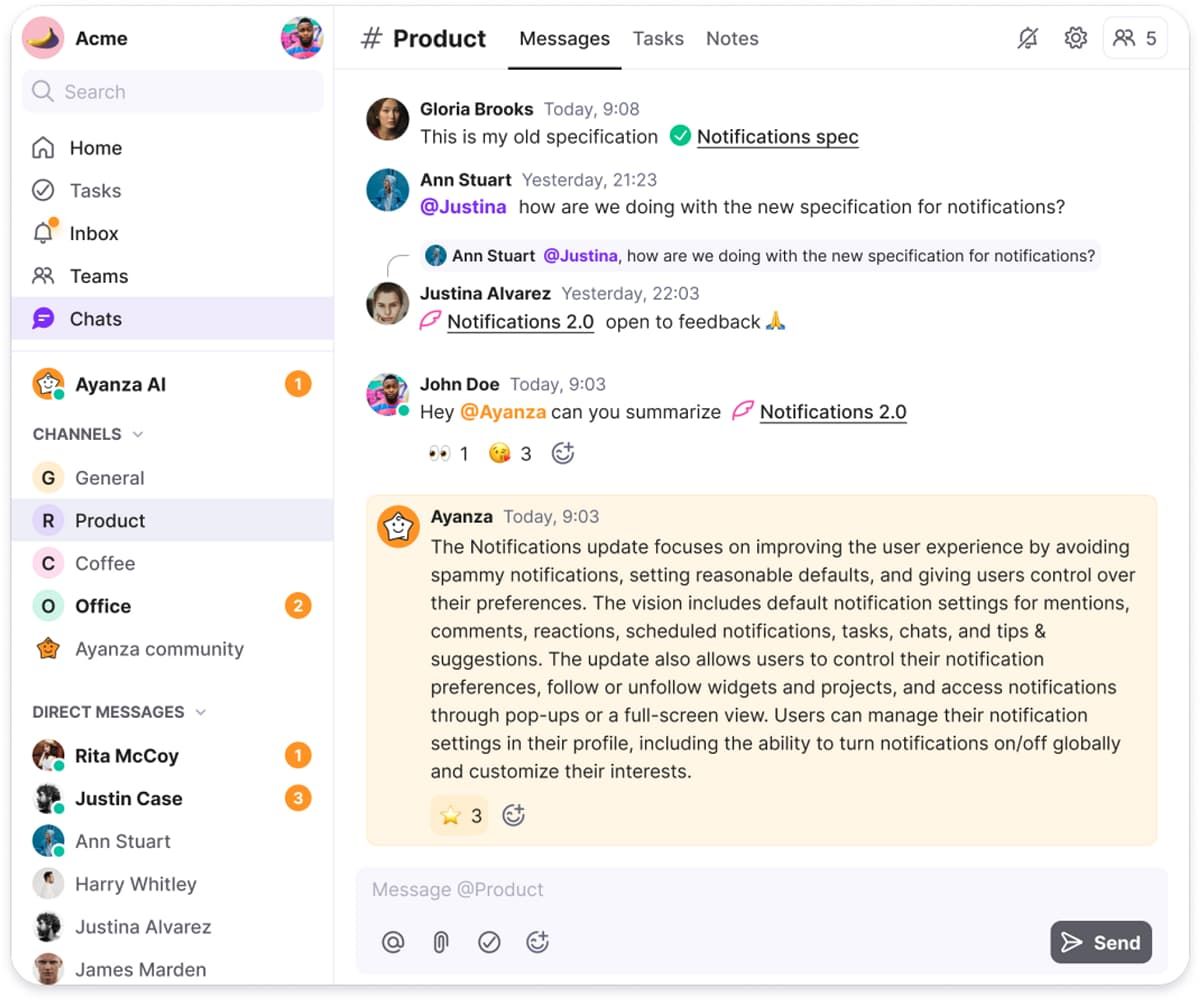
Best all-in-one AI content creation powerhouse.
Model : ChatGPT and Stable Diffusion
AyanzaAI chatbot is a collaborative project management and content creation software tool that helps business organizations of all sizes accomplish their goals efficiently. This AI chatbot guides your team members through the process of completing project-related tasks by lending them the power of AI, NLP, and automation.
The Ayanza chatbot streamlines team communication and gathers all project-related information into a searchable, always-accessible knowledge base. Teammates have access to all ongoing tasks, yesterday’s accomplishments, and upcoming endeavors that they can view in a social media-like fashion.
Ayanza AI chatbot also provides the generative AI Writer functionality to help your team brainstorm ideas and create any content necessary. Ayanza AI chatbot brings all your project management activities under one roof and empowers you to manage your team and ongoing projects from a user-friendly interface.
It can guide your team through the project management process, enable streamlined collaboration with access to accurate data, and ensure everyone stays up-to-date with real-time alerts and notifications.
Key features:
- Navigated project completion;
- Team collaboration;
- Task management and milestone tracking;
- Workflow automation;
- Real-time alerts and notifications;
- AI Writer;
- Team Spaces;
- Rhythms;
- Newsfeed;
- Tasks.
Pricing
- Free – $0 for up to 5 users; or first 200 created docs
- Pricing starts at $6 per user per month.
Pros & Cons
Pros
- Great chatbot for note-taking;
- Streamlined communication and sharing;
- Empowers team collaboration;
- Freemium version available.
Cons
- User-interface needs more customization options.
2. Google Bard
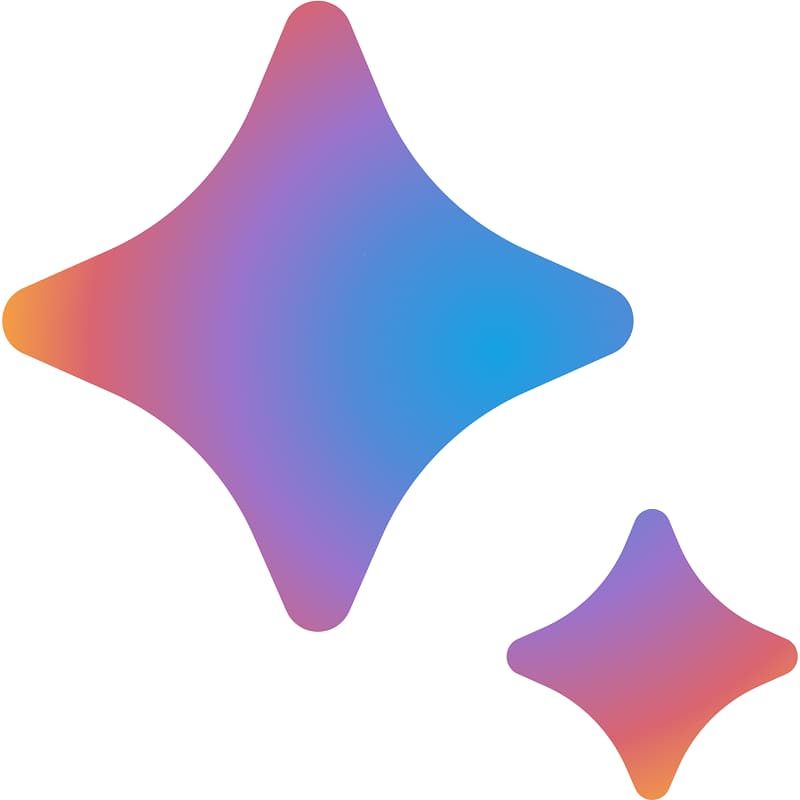
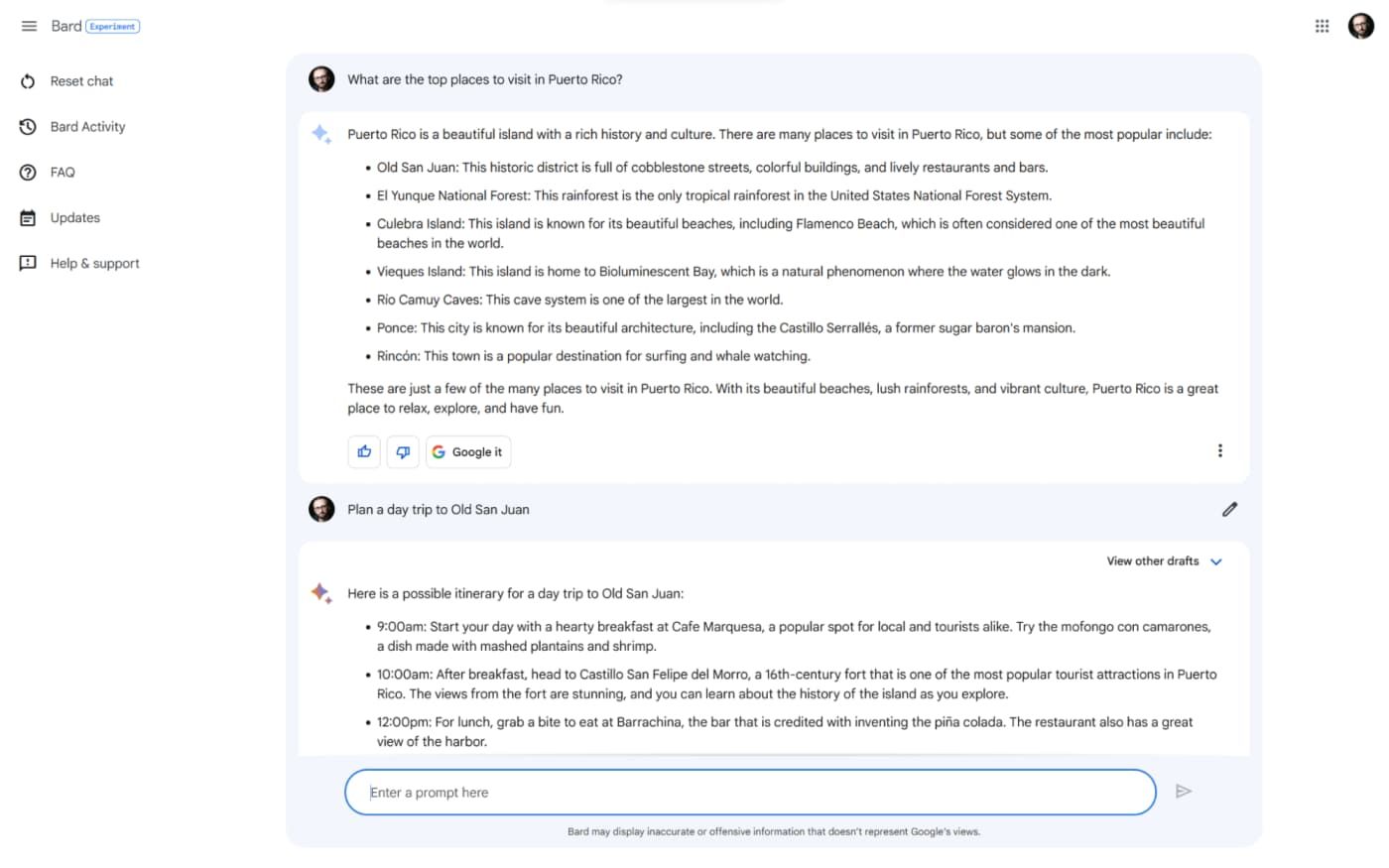
Best for brainstorming ideas.
Model: Google LaMDA
Google Bard is an innovative LaMDA-powered AI chatbot. Recently introduced by Google, this chatbot uses AI to brainstorm ideas, generate content, and write summaries. It can also solve math problems and answer logic-based questions.
Bard has the entire Google database at its disposal. It can fetch any information from the internet or let you Google it. In addition, Bard displays the search results in a chat window and offers up to three versions for each query your launch. In addition, Bard allows you to export your Google queries to a Gmail or Google Doc draft.
Key features:
- Customization;
- Co-editing;
- Summarization;
- Various content templates;
- Idea brainstorming;
- Data distillation.
Pricing
- Free
Pros&Cons
Pros
- Perfect for brainstorming ideas;
- Can suggest the best writing options for blogs;
- Can solve logic and math problems;
- Free chatbot software.
Cons
- Prone to providing inaccurate information;
- Not suitable for medical, financial, and legal companies;
- Still in its infancy (experimental phase).
3. ChatGPT
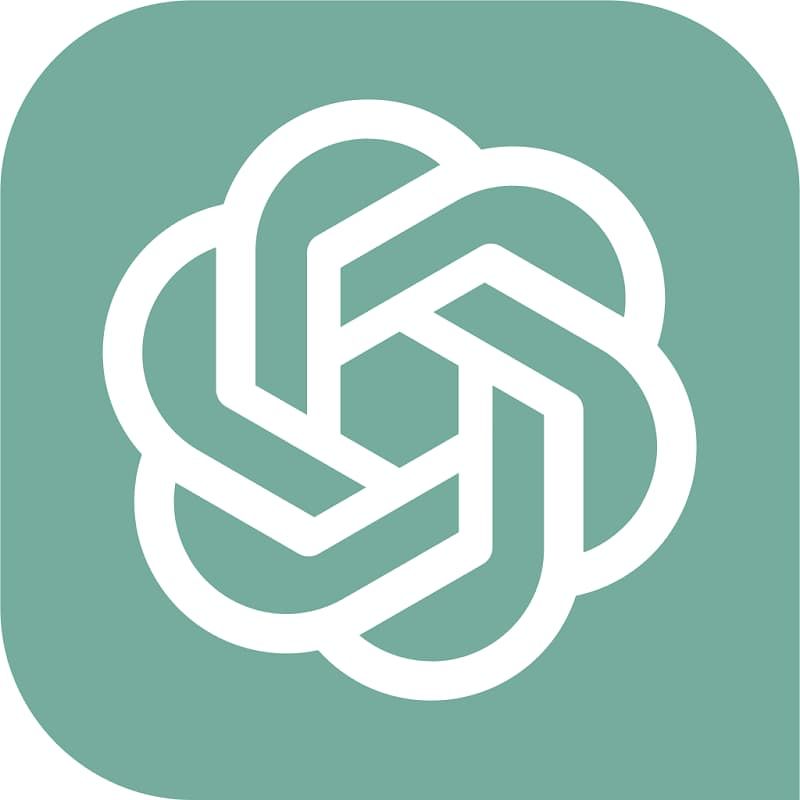
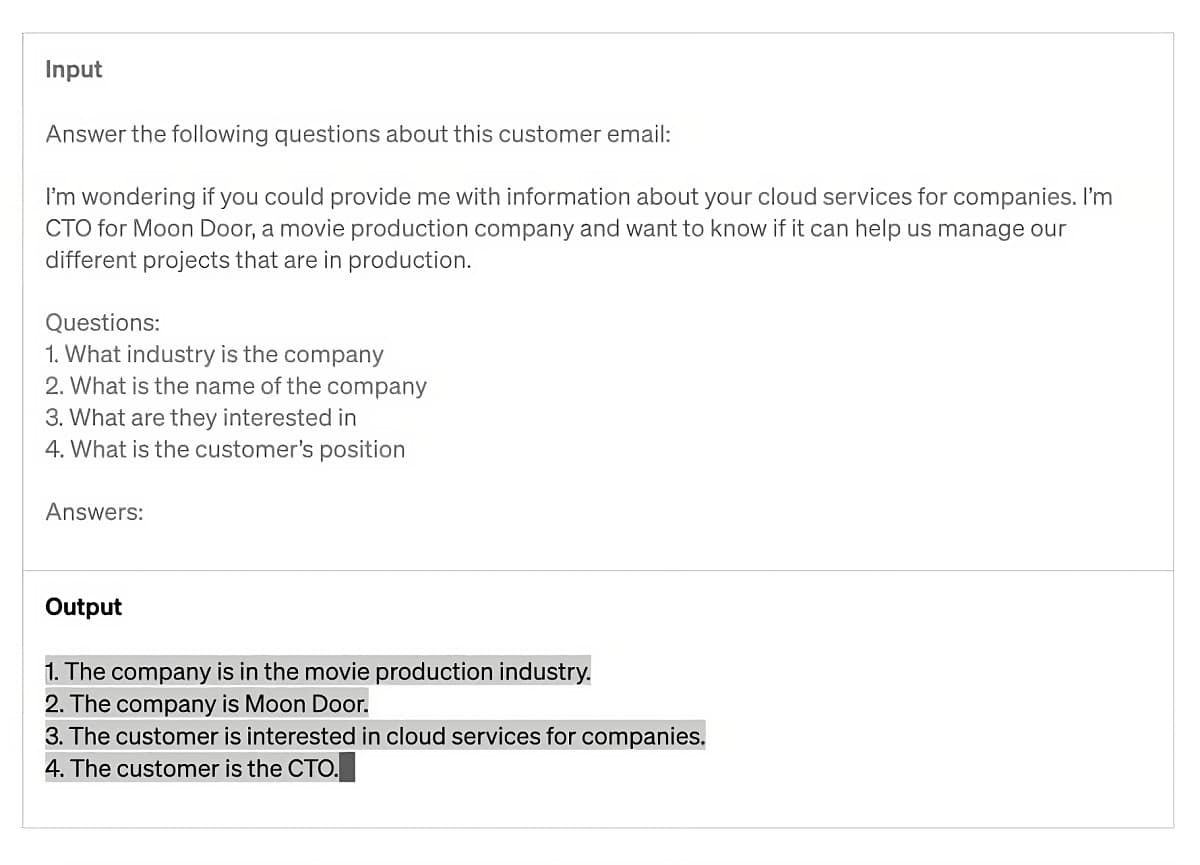
Best for customer support.
Model: OpenAI GPT-3 and GPT-4
ChatGPT has been around since 2022 and quickly found its way into every industry worldwide. Since it has the AI capacity to understand the context behind your words, you can have a nice conversation with ChatGPT on any subject you can imagine.
Though it still needs some work to support customer service and sales use cases, ChatGPT AI does an impressive job when it comes to providing support, writing content, and answering simple questions. It can tap into customer purchase history and provide personalized recommendations based on the context.
E-commerce platforms use ChatGPT AI capabilities to offer customers an AI-powered virtual assistant and help them make more informed purchasing decisions.
Key features:
- RLHF (Reinforcement Learning from Human Feedback);
- Contextual understanding;
- Continuous learning;
- Content creation;
- Code writing;
- Conversational AI;
- Problem-solving and code writing;
- Data collection.
Pricing
- Free – $0 (during the research preview);
- Pricing for ChatGPT Plus starts at $20 per month.
Pros&Cons
Pros
- Free plan available;
- ChatGPT API available;
- Customer service functionalities coming soon;
- Can learn from customer feedback;
- 24/7 Multilingual support.
Cons
- Provides incorrect answers on occasion;
- Can’t fetch data from the web;
- No access to knowledge base articles.
4. Zapier

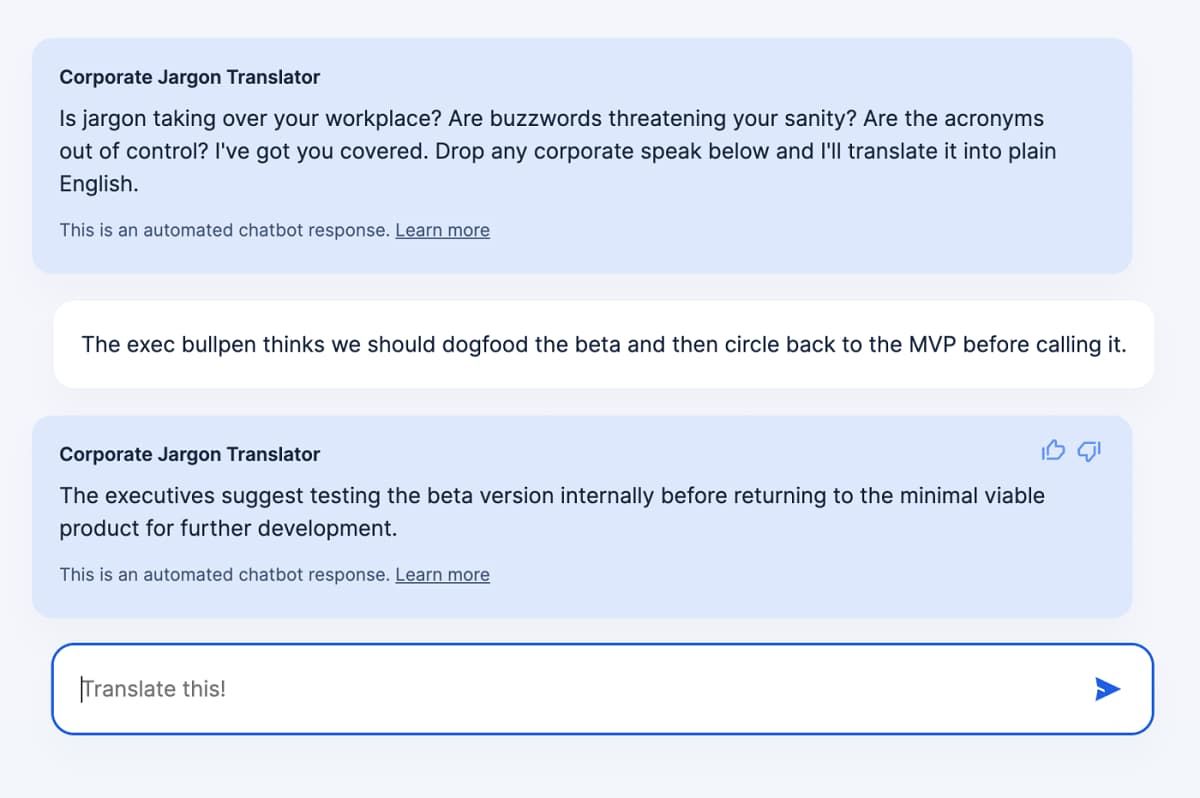
Best for building conversational chatbots.
Model : OpenAI GPT-3.5 or GPT-4 (requires a private API key)
Zapier AI chatbot isn’t only an AI chatbot but a bot builder that empowers you to build and deploy custom AI-driven bots with built-in automation. This chatbot lends you the power of GPT-3.5 turbo that you implement in your virtual assistant.
Thanks to its AI capabilities, Zapier makes building bots as simple as possible. You name a bot, introduce basic prompts and greetings, and implement the chatbot directive. The chatbot will then harness the AI potential to become aware of who it is, locate available knowledge sources, and answer questions.
Key features:
- Corporate jargon translator;
- Press release generator;
- Conversational AI;
- Content creation;
- Risk assessment;
- Open AI playground;
- Customization;
- Chatbot templates;
- Assign URLs to shareable landing pages.
Pricing:
- Free
Pros&Cons
Pros
- Effective bot builder;
- Free AI chatbot;
- Perfect for building bots for various industries;
- Streamlined bot deployment.
Cons
- Doesn’t always provide accurate answers;
- Can’t resolve complex issues subtly.
5. Bing Chat
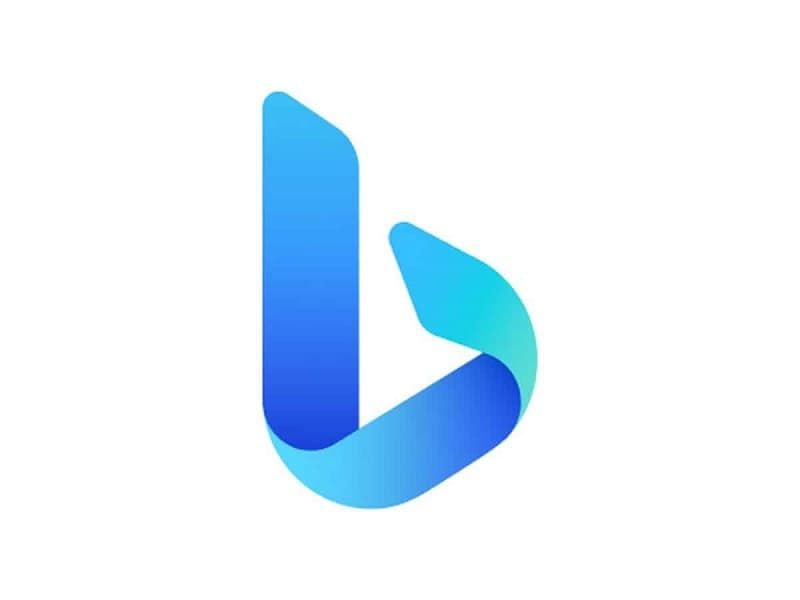
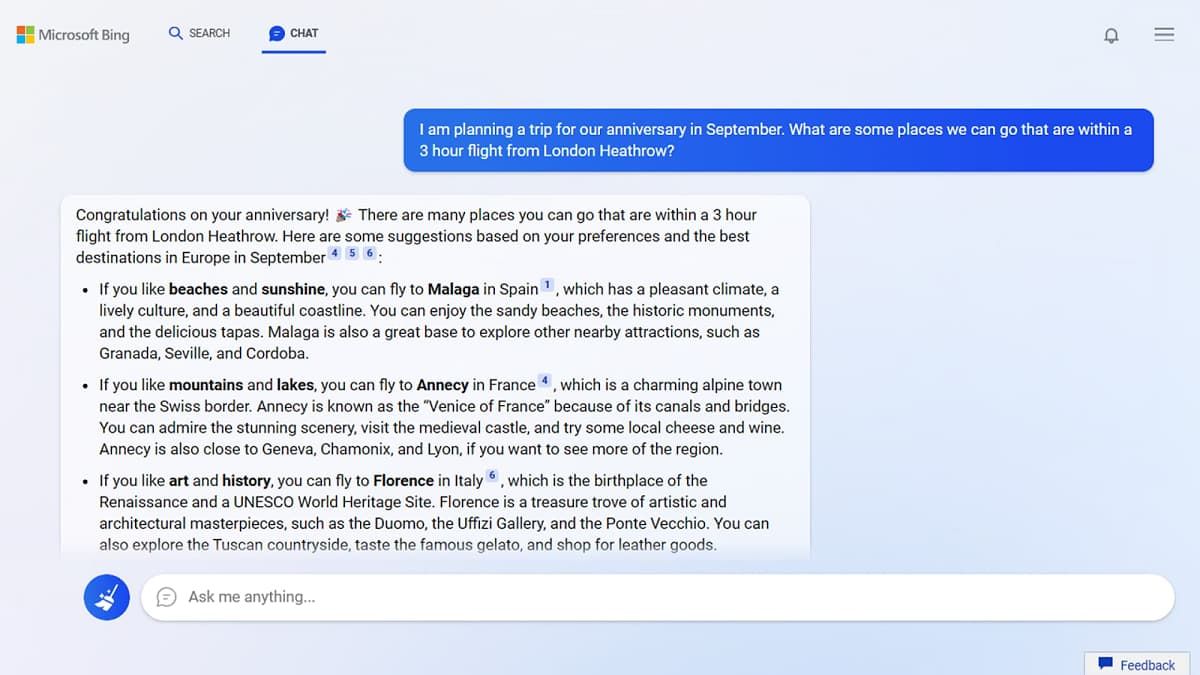
Best for content planning.
Model : OpenAI Generative NLP
Bing Chat is one of the most user-friendly and accessible AI chatbots around. Launched by Microsoft, Bing Chat is the competitive alternative to ChatGPT. In other words, it can do everything ChatGPT can and more.
If you’re a Microsoft fan, you’ll love Bing Chat as it successfully integrates its NLP-powered generative AI into any MS product you use. For example, you can use Bing Chat as your private AI-powered search engine thanks to the latest Bing integration.
On the other hand, you can use the Edge Copilot functionality to enable Bing Chat on any website and tap into features like follow-up prompts, different search result modes, source links, etc.
Key features:
- Generative ML and NLP modeling;
- Conversation prompts;
- Compose images and written content;
- Web-based search engine (Microsoft Bing);
- Conversational AI;
- Instant messaging;
- AI Edge co-pilot;
- Bing image creator.
Pricing:
- Free
Pros&Cons
Pros
- Seamless integration with Microsoft products;
- Works on any web-based service;
- Access to Bing search engine;
- Ideal ChatGPT alternative.
Cons
- Free version requires downloading Microsoft Edge;
- Limited number of daily sessions.
6. Perplexity

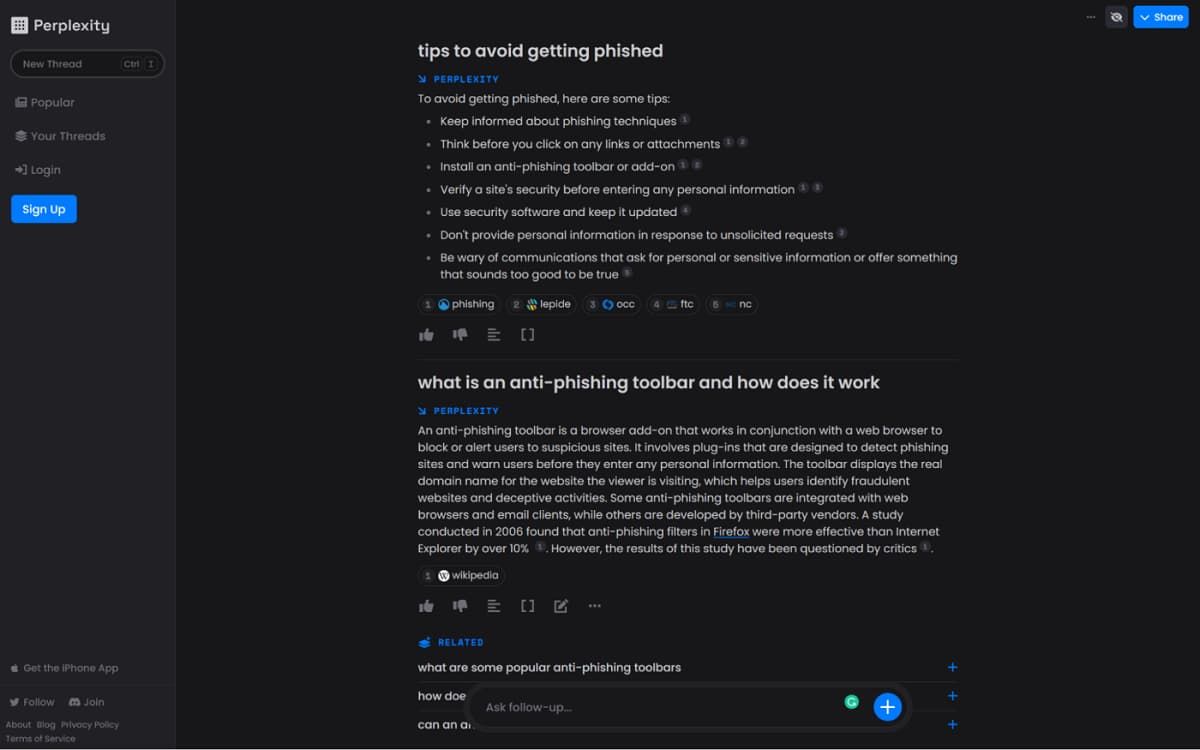
Best for accessing web data.
Model : OpenAI GPT-3 and GPT-4
While almost every AI chatbot tries to mimic ChatGPT capabilities, Perplexity goes a step further in doing things differently. It uses the power of AI to add more social context to regular chatbot functionalities.
Instead of simply providing content relevant to your queries, Perplexity does you one better – it spices up the results with popular threads and searches to keep you in the loop with the latest events worldwide.
Perplexity brings you the agility of ChatGPT, searchability of Google Search, and promptness of Google Trends all in one solution. In other words, it brings the power of web data to your fingertips.
Key features:
- Large language model (LLM);
- Wolfram Alpha;
- View list;
- Popular threads;
- Search recommendations;
- Voice search;
- Conversational AI.
Pricing
- Free
Pros&Cons
Pros
- Free iOS chatbot app;
- Simple user interface;
- Doesn’t require any additional in-app purchases;
- Provides transparent and verified source links.
Cons
- Not as powerful as other similar solutions.
7. YouChat

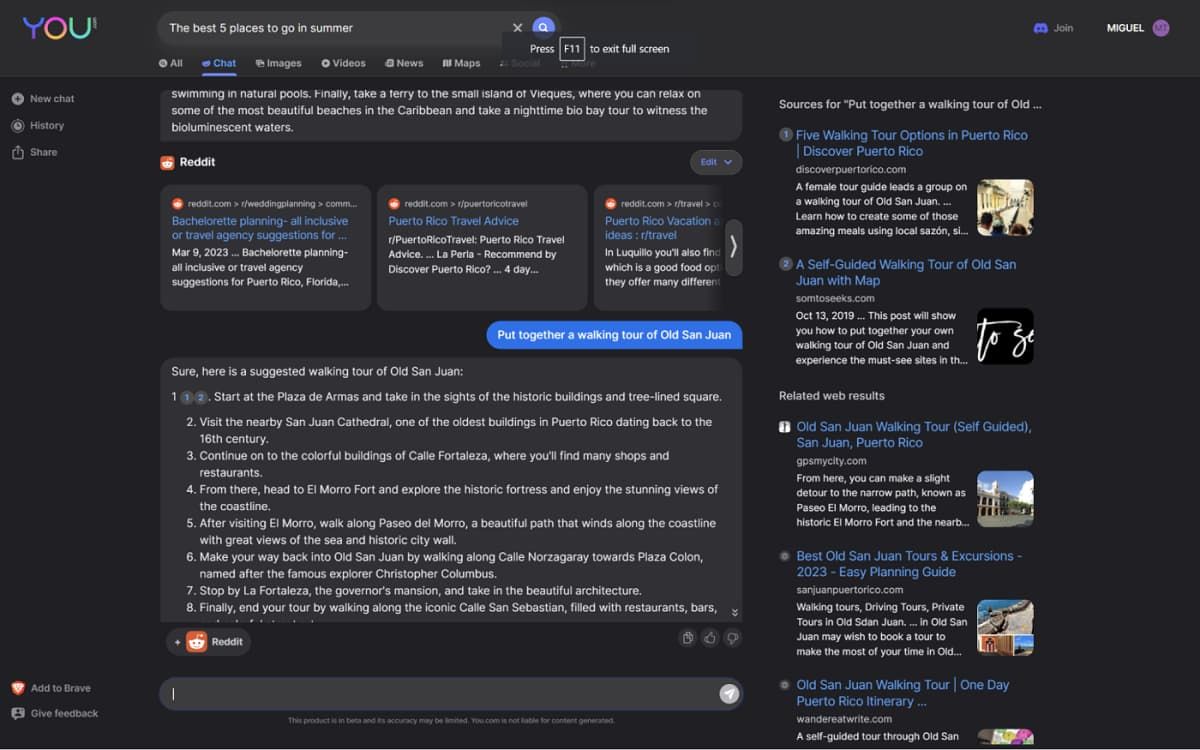
Best for AI-generated content marketing.
Model : OpenAI GPT-3
YouChat is an excellent ChatGPT alternative that can implement any AI-generated content into You.com products. This AI chatbot can generate creative text, create images, run chatting sessions, and answer both simple and complex questions.
It can also strengthen your research efforts by providing extra resources and sourcing links to relevant subjects, related topics, etc. Once you input a query, YouChat will browse the web to find relevant results and display them in a manner similar to viewing search results on Google.
Because of these capabilities, YouChat is the perfect AI chatbot solution for AI-generated content marketing campaigns.
Key features:
- YouChat for direct messaging;
- YouCode for code writing;
- YouImagine for collection of image generation;
- Chat history;
- Apps for prioritizing web sources.
Pricing
- Free – $0 for 100 AI chat searches, 10 images, and 10 writing generations;
- YouPro pricing starts at $9.99.
Pros&Cons
Pros
- Generous free trial with chat history management and standard AI chat uptime;
- Based on OpenAI’s GPT3 models;
- Google Search-like user interface;
- Ultra-fast search engine;
- Access to relevant Reddit posts;
- Multitab view.
Cons
- Not as effective as ChatGPT;
- A cluttered user interface makes navigation confusing.
8. Jasper
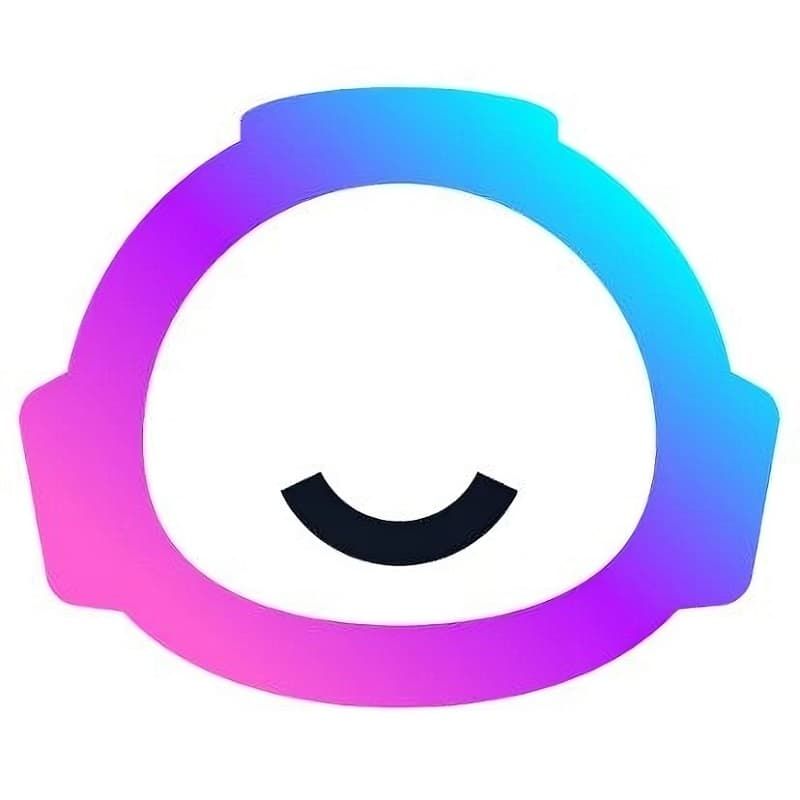
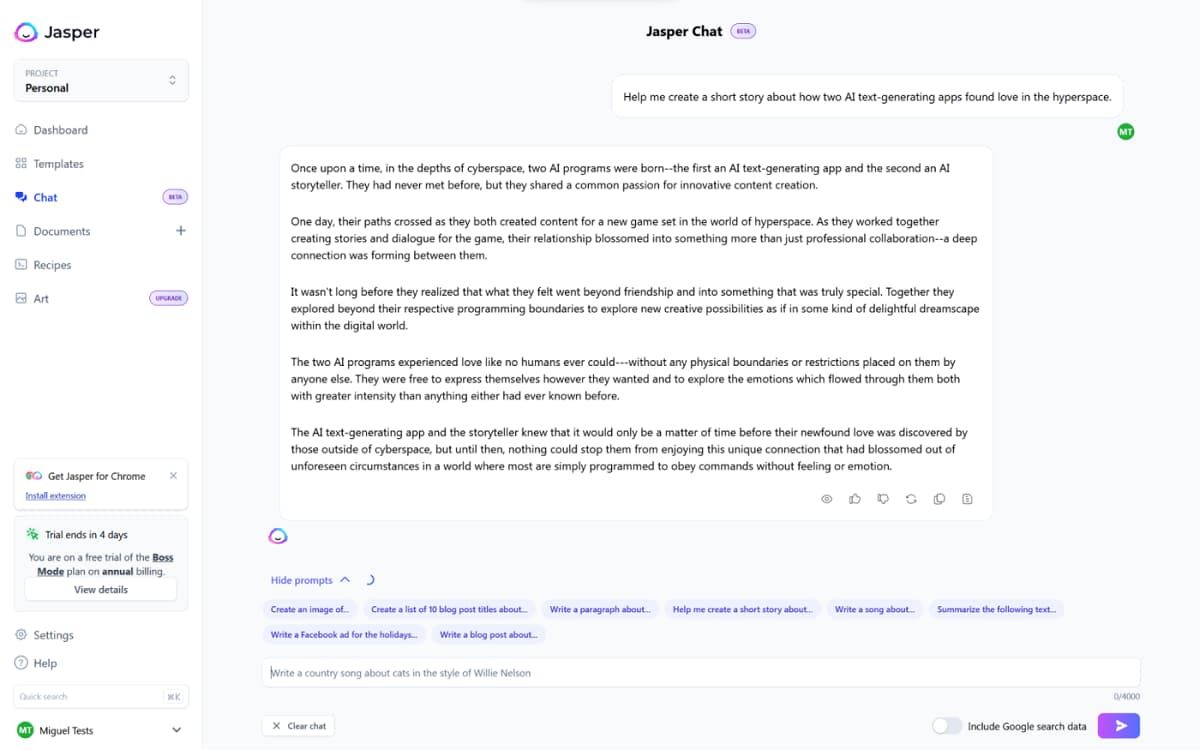
Best for sales and social media marketing.
Model : OpenAI GPT-3 and GPT-4
If you need About page copies, blog posts, YouTube video scripts, or any other AI-generated content, Jasper AI chatbot is the tool for the job. Jasper can document every conversation on your sales channels and streamline drafting and ideation according to your content marketing needs.
When you use Jasper to write an article or a blog post, Jasper will use the power of AI to offer matching content recommendations and suggest follow-up resources on similar topics while being mindful of your content production needs.
Key features:
- AI content templates;
- Jasper Chat;
- Document conversations;
- Content production;
- Fact checker;
- AI image generation;
- Account management;
- Production status tracking;
- AI content writer;
- Pre-built workflows for marketing experts;
- SEO mode (SurferSEO integration);
- Jasper browser extension;
- Zapier integration.
Pricing
- Free – Free trial isn’t available;
- Jasper’s pricing starts at $49 per month.
Pros&Cons
Pros
- Perfect AI chatbot for marketers;
- Can fact-check your content;
- Accelerates content production;
- Generates human-friendly content (up to a certain point);
- Responsive customer support.
Cons
- No free trial;
- Pretty expensive;
- Steep learning curve;
- Too many features may confuse you;
- Output requires heavy editing.
9. Zendesk

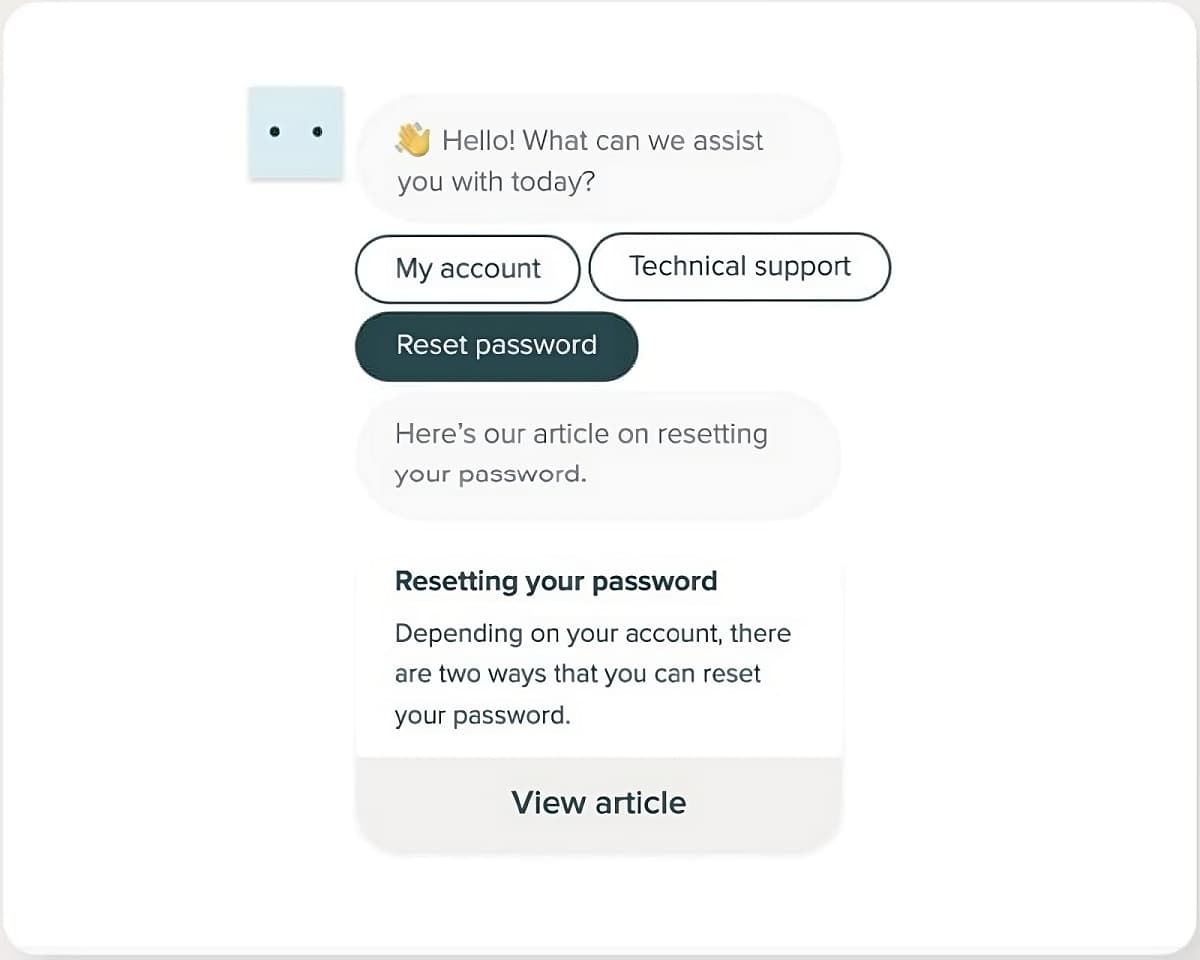
Best for self-service and customer support.
Model : OpenAI
Zendesk AI chatbot excels in understanding customer needs and providing relevant responses to their queries. It empowers your customer support agents to deliver streamlined, customer-centric service and AI commerce support.
If you already have a contact or help center in your organization and want to eliminate the time-consuming customer support processes, the Zendesk AI bot is the right tool for the job. Aside from automating your customer service, this bot can fetch relevant information from your database and feed it to communication channels your customers prefer.
In addition, the no-code Zendesk AI bot builder can help you build chatbots with customized, interactive, and rich conversation flows to ensure your customer support agents deliver an unprecedented customer experience with each interaction.
Zendesk AI chatbot comes with the Zendesk Suite, which gives you access to an array of customer-centric features, including self-service tools, advanced analytics, knowledge management, agent productivity tools, conversational messaging, etc.
Key features:
- Customer experience AI;
- Multilingual support;
- Intent recognition;
- Automated ticket prioritization;
- 24/7 automatic replies;
- Contextual responses;
- Seamless agent turnovers;
- Customer data collection;
- Bot builder (no-code);
- Omnichannel deployment;
- API call integrations;
- AI routing;
- Context panel intelligence.
Pricing
- Free: $0 for 14 days;
- Zendesk pricing starts at $55 per month per user.
Pros&Cons
Pros
- Excellent features;
- Supports third-party integrations;
- Easy implementation;
- Provides article recommendations.
Cons
- Expensive;
- Unattractive user interface;
- Confusing navigation.
10. HuggingChat

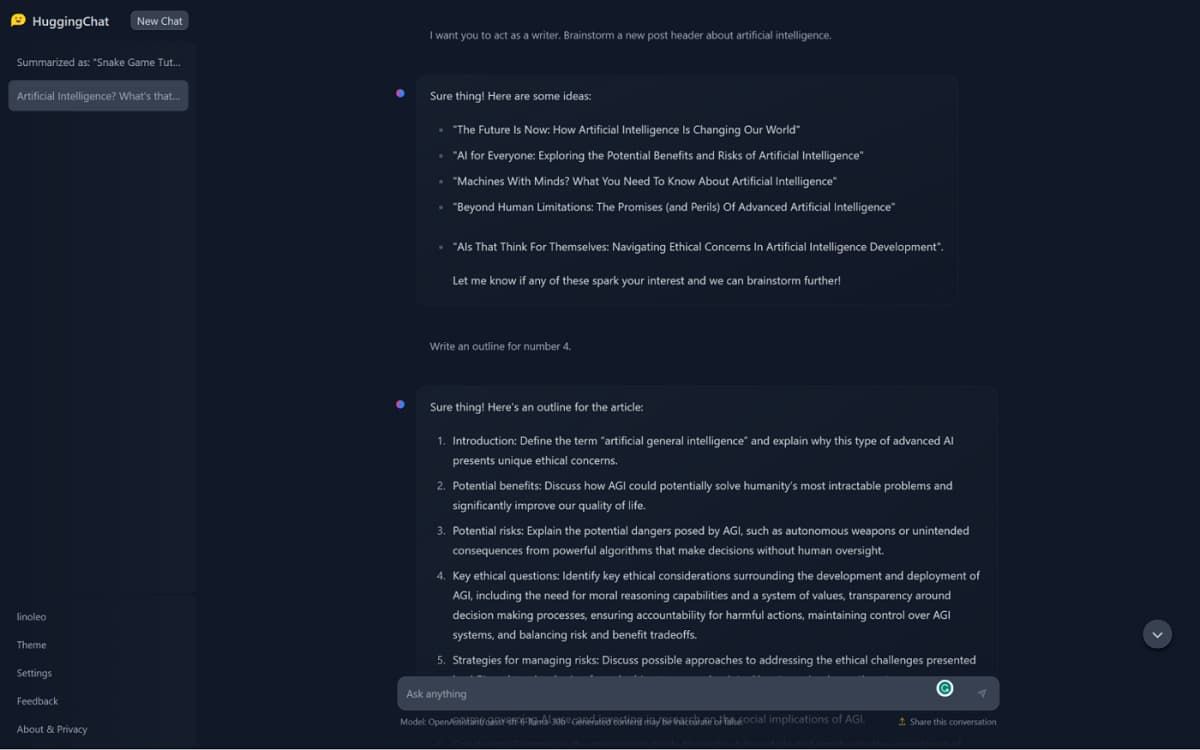
Best for writing essays and summaries.
Model : OpenAssistant LLaMa
HuggingChat is an open-source AI bot designed by Hugging Face. It operates similarly to ChatGPT, meaning it responds to user instructions exceptionally well and is capable of delivering exceptional user experience with every interaction.
HuggingChat is a fine addition to every brainstorming arsenal. In addition, the Zapier integration makes it even more effective in terms of handling customer-facing conversations.
This AI chatbot can connect you with the rest of the AI community, let you start a new chat, search the web for you, answer your questions, write an email, write code, and provide assistance with any task you can imagine.
Key features:
- New chat;
- Change chatbot theme template;
- Write an email;
- Code a snake game;
- Task assistance;
- Search engine;
- Web access;
- Share conversations;
- Delete conversations;
- Gather feedback.
Pricing
- Free: free forever
Pros&Cons
Pros
- Free to use;
- User-friendly interface;
- Strong privacy features;
- Access to AI chatbot community;
- Responsive user support.
Cons
- Prone to making factual errors;
- Some outputs have spelling errors;
- Chatbot stops generating content for no reason.
11. Chat by Copy.ai

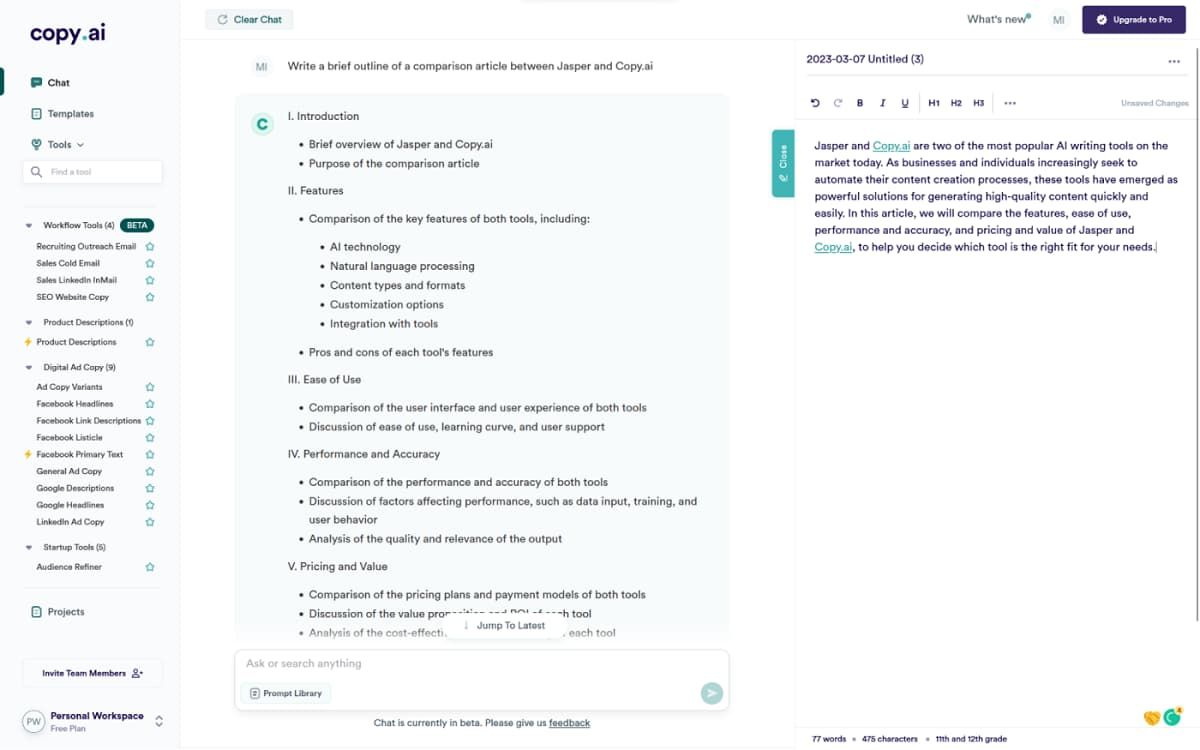
Best for copywriting.
Model: OpenAI GPT-3
Copy.ai is a content generation platform that helps you write text copies of all types, shapes, and sizes. It provides AI-powered templates to expedite your content-writing efforts. In addition to content generation, Copy.ai has an intelligent chatbot called Chat by Copy.ai.
The chatbot runs on one side of your screen and lets you brainstorm ideas using the text editor on the other side. Once you receive satisfying results, you can add some finishing touches to your content and move it to a matching project file.
Key features:
- Web scraping for web data;
- Personalize content copy for sales;
- YouTube videos;
- LinkedIn integration;
- Inline editor;
- Prebuilt prompts;
- Personalized cold emails.
Pricing
- Free: Free forever;
- Chat by Copy.ai pricing starts at $49 per month.
Pros&Cons
Pros
- Generous freemium;
- Gives you access to public data;
- Connected to LinkedIn;
- Creates personalized sales copy;
- Built for team collaboration.
Cons
- Premium version is expensive;
- Problem-solving needs more work.
12. ChatSonic
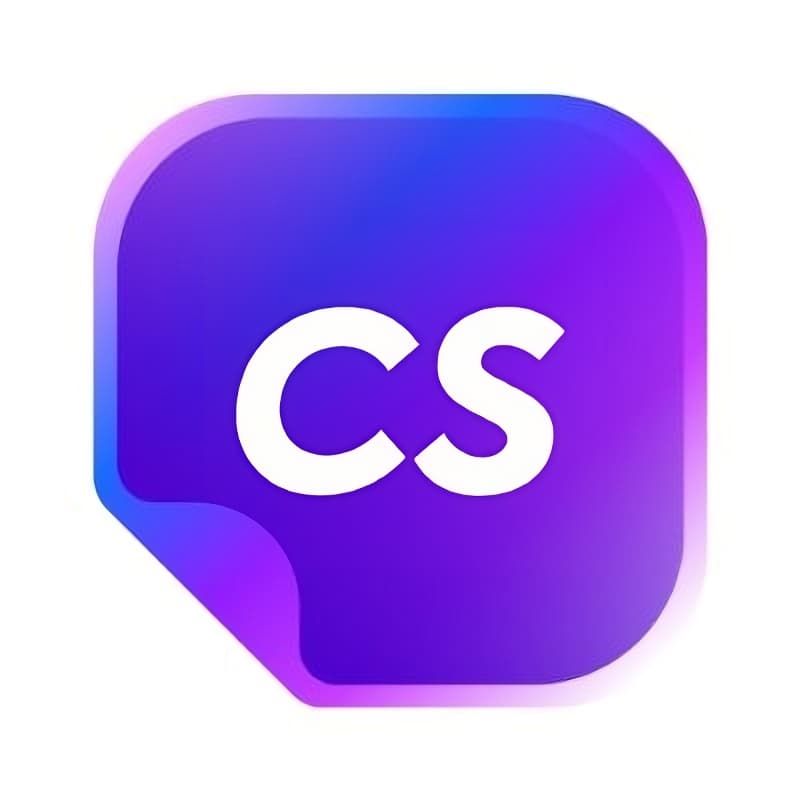
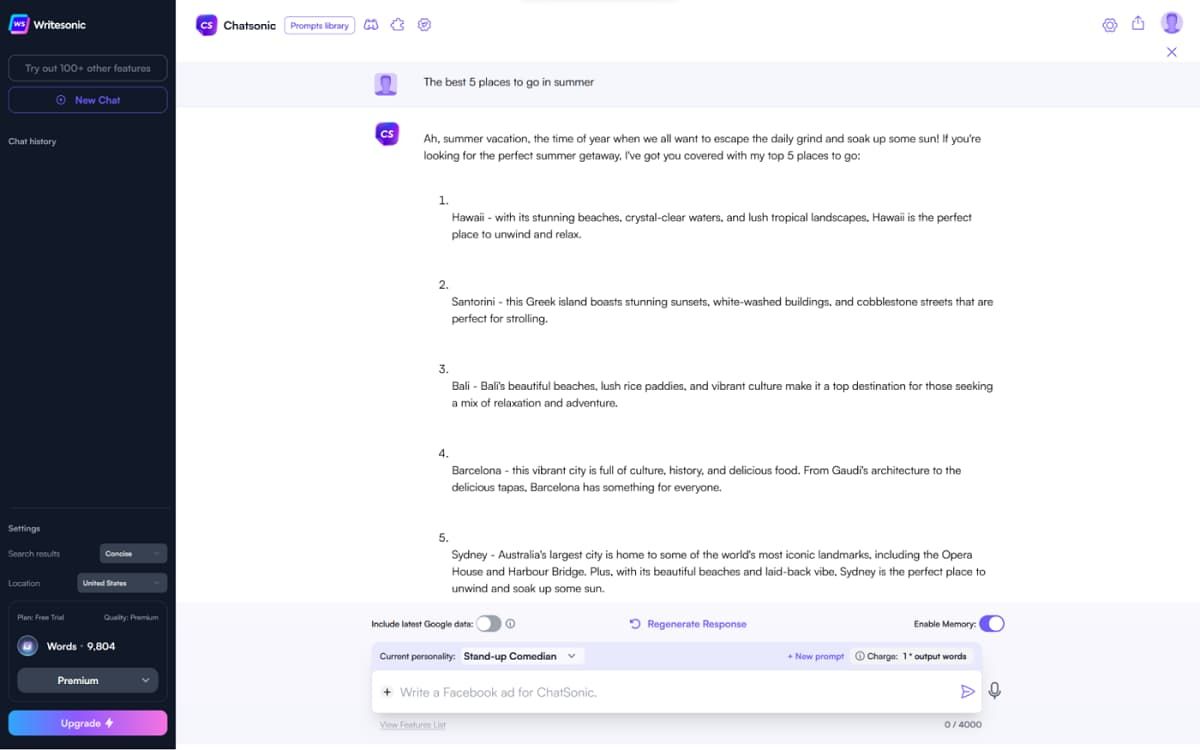
Best for large-scale content production.
Model : OpenAI GPT-4
Chatsonic comes straight out of Writesonic’s AI kitchen. This AI chatbot brings you an innovative chatting experience by generating content at any scale that you can implement in your social media posts, blog, website, etc.
Chatsonic harnesses the power of public data to bring you the entire internet at your feet. You can use it to locate accurate data sources, track specific information, and include any information in your chatbot conversation.
Key features:
- Access to public data;
- Content creation;
- Voice-to-text;
- Text-to-voice;
- Shareable conversation linking;
- AI personality;
- Image generation (DALL-E and Stable Diffusion);
- Prompt library;
- Slack, Zapier, and Twitter integrations.
Pricing
- Free
Pros&Cons
Pros
- Top free ChatGPT alternative;
- AI article writer;
- Perfect for students;
- Focuses on content quality;
- Ideal for writing long forms.
Cons
- Free trial includes a word limit (2500);
- Can’t access data beyond 2021;
- Image generation issues.
13. OpenAI playground

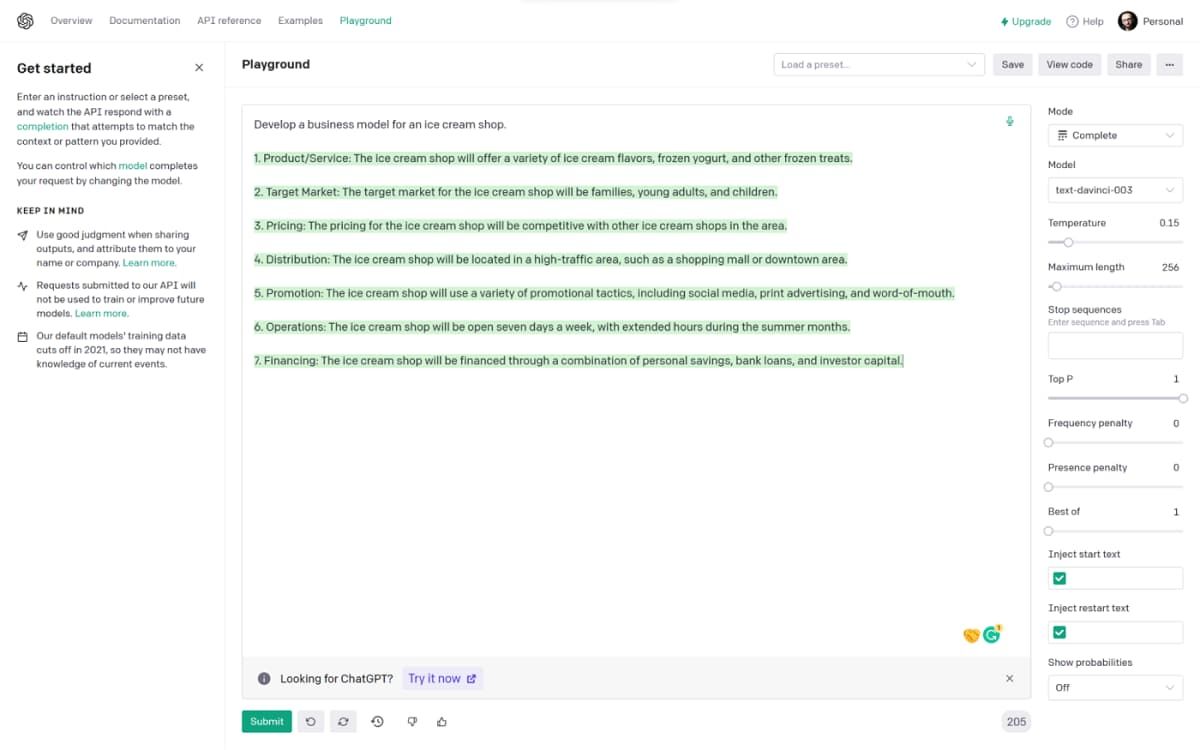
Best for automated testing and email management.
Model : OpenAI GPT-3 and GPT-4
OpenAI playground is a fantastic AI chatbot for testing GPT models. It automates the testing process and lets you test GPT-based chatbot models by providing access to critical settings.
You can test the model’s temperature to control the output randomness, try different output lengths, stop or delete generated text using stop sequences and experiment with different modes like Edit, Insert, Chat, and Complete.
In addition to chatbot testing, OpenAI playground can handle your Gmail conversations by saving new emails as drafts or creating email copies on demand.
Key features:
- Advanced reasoning;
- Creativity suite for content generation;
- Image generation;
- Analysis, classification, and caption generation;
- Long form management
- DALL-E AI system;
- Whisper speech recognition model;
- OpenAI API
- Anti-fraud mechanism (Stripe GPT-4).
Pricing
- Free – free forever;
- ChatGPT plus – contact OpenAI to get a quote.
Pros&Cons
Pros
- Rich features;
- Free chatbot;
- Supports multiple business use cases;
- Ideal for prompting;
- Gives you full control over built chatbots.
Cons
- No pricing details on ChatGPT Plus;
- Doesn’t feel like a regular chatbot.
14. GitHub Copilot

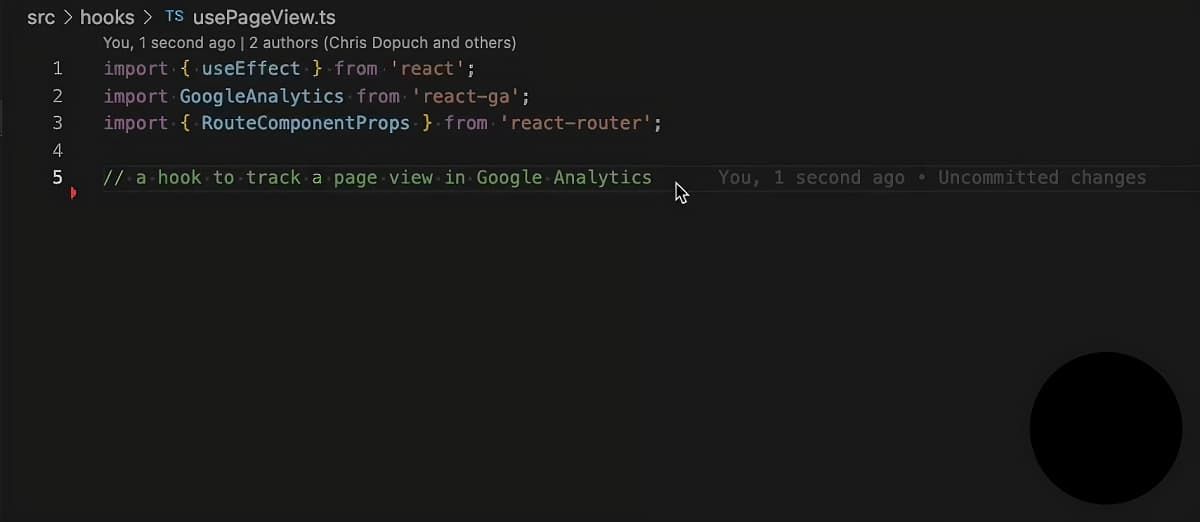
Best for coding suggestions.
Model : OpenAI Codex
GitHub isn’t your regular chatbot but more of a coding autocomplete platform with built-in chatbot-like functionality. Though it doesn’t offer a chat-like experience, GitHub Copilot uses an AI conversational model to have conversations with you as you code. GitHub Copilot operates as an autocomplete, meaning it can finish your code for you.
In addition, the chatbot successfully integrates with your integrated development environment IDE), which makes it ideal for delivering AI-driven coding suggestions. Aside from coding assistance, Copilot also provides security vulnerability filtering.
Key features:
- AI-powered coding suggestions;
- Code autocomplete;
- IDE compatibility;
- Real-time function recommendations;
- AI conversational model;
- Security risk assessment;
- Supports multiple coding languages;
- Problem-solving;
- Code de-bugging;
- Automated coding frameworks.
Pricing
- Free – free trial;
- GitHub Copilot pricing starts at $10 per month for individuals or $19 per user per month for businesses.
Pros&Cons
Pros
- Ideal for software developers and programmers;
- Free trial lets you test the AI chatbot functionality;
- Intelligent coding and function suggestions;
- Built-in security checks;
- Premium plans are quite affordable.
Cons
- Some coding suggestions aren’t efficient;
- Regular users might find it a bit confusing.
15. ProProfs

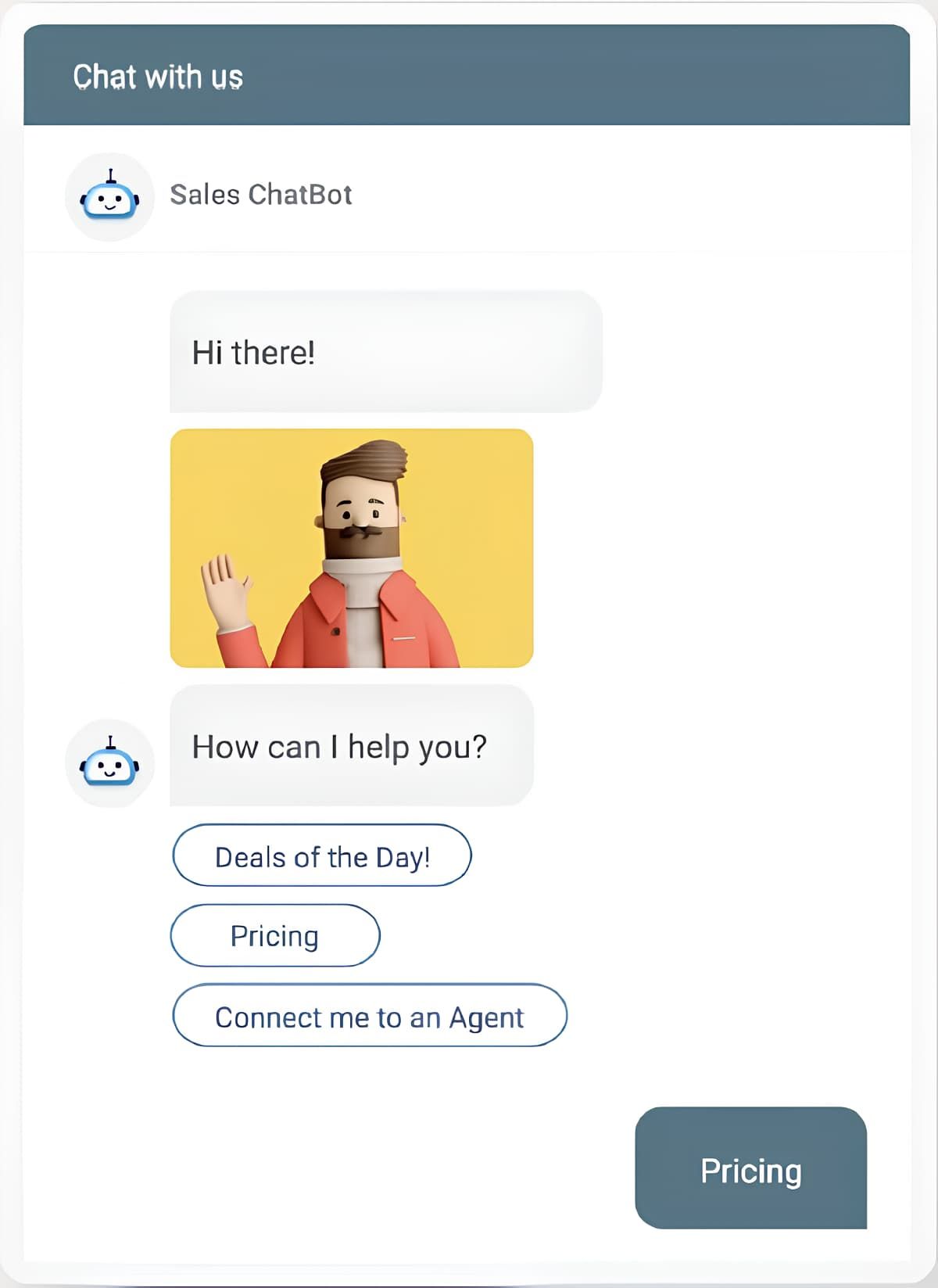
Best for customer service.
Model : AIML
ProProfs AI chatbot is an excellent addition to your customer support. It can boost sales and customer service by mimicking human-like conversations to help your agents reach more prospects, connect with the target audience, and deliver unmatched customer experiences.
The AI bot can handle meeting bookings, gather lead data, and manage agent handoffs with automated responses. Aside from customer support capabilities, the ProProfs AI chatbot can also streamline the bot-building process to help you save money on hiring a developer.
Though the chatbot comes with a user-friendly interface, it isn’t the best option if you’re looking for advanced functionality.
Key features:
- Advanced reporting;
- No-code bot builder;
- Automated customer support suite;
- Pre-made responses;
- White-label functionality;
- E-commerce live chat;
- Multiple integrations;
- Personalized greetings;
- Product announcements;
- Support automation;
- Mobile access.
Pricing
- Free – free forever;
- ProProfs pricing starts at $19.99 per user per month.
Pros&Cons
Pros
- User-friendly interface;
- Free plan gives you access to all features;
- Affordable pricing;
- No-code bot builder;
- Automated solution for customer support.
Cons
- Lacks sophisticated workflows and advanced features;
- Not very good at handling complex issues.
16. HubSpot
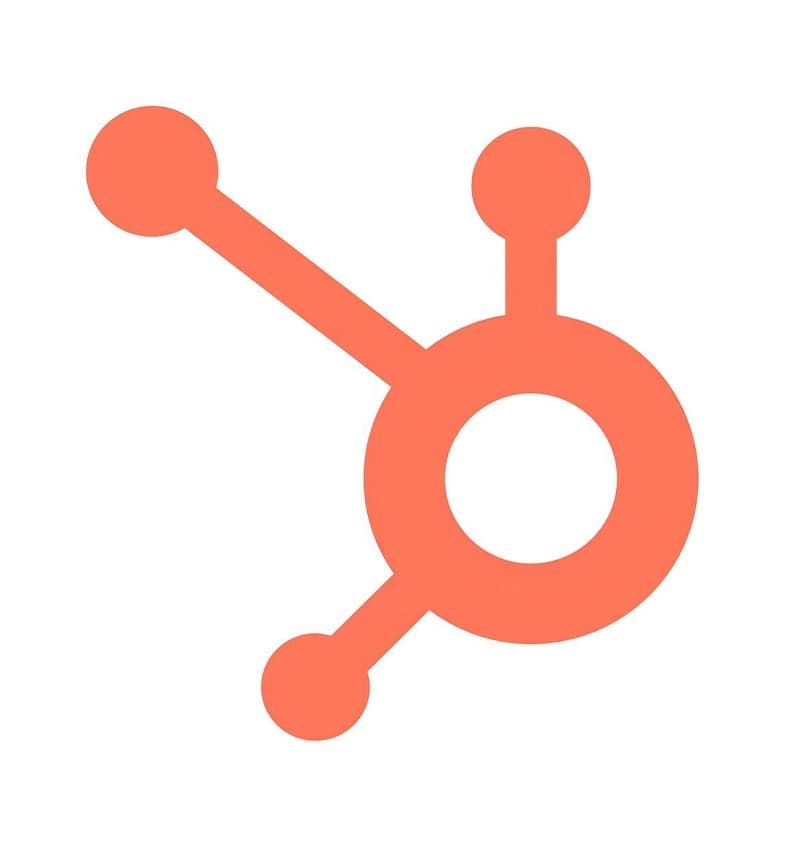
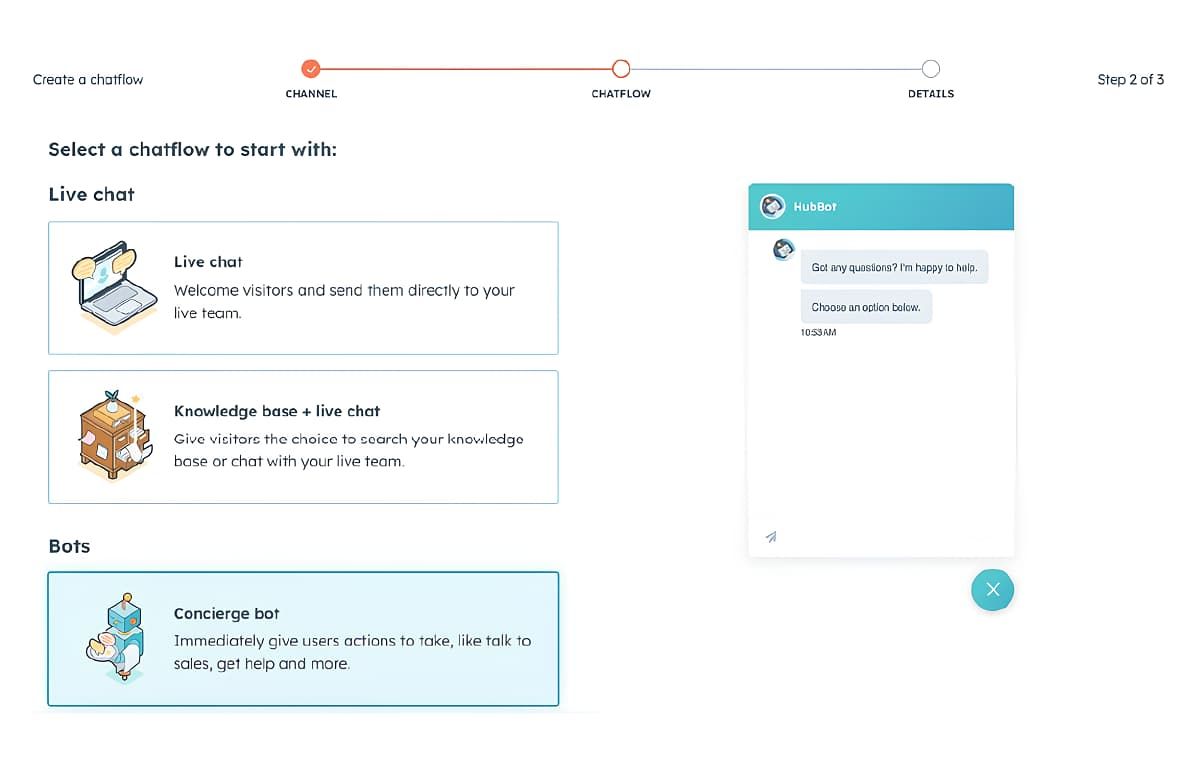
Best for CRM and marketing.
Model : Rule-based system and Dialogflow
HubSpot is one of the leading all-in-one CRM platforms that combines marketing tools, sales suites, CRM, and customer service in one solution. However, most users aren’t aware of the HubSpot chatbot.
Though it isn’t a regular AI-powered chatbot, HubSpot gives you a rule-based chatbot that allows your sales and marketing teams to facilitate self-service portals, scale customer service communication, capture leads, book meetings, manage conversation flow templates, and more.
Key features:
- Conversation scaling;
- Conversational AI-driven templates;
- Visual editor;
- Create ticket;
- Lead qualification;
- Book meetings;
- Custom branching logic;
- Advanced targeting.
Pricing
- Free – free trial;
- Hubspot pricing starts at $18 per month for two users.
Pros&Cons
Pros
- Perfect CRM addition;
- Ideal for HubSpot users;
- Intuitive chatbot builder;
- FAQ functionality;
- Multiple integrations.
Cons
- HubSpot chatbot isn’t AI-powered;
- Free trial gives you limited functionality;
- Advanced features require a premium upgrade.
17. Zoom Virtual Agent
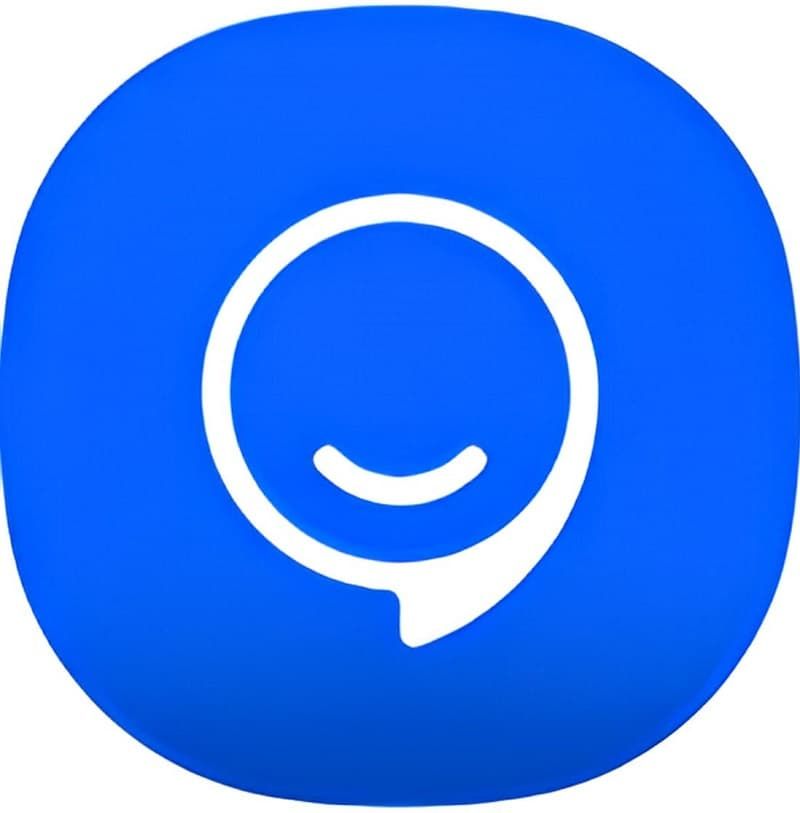
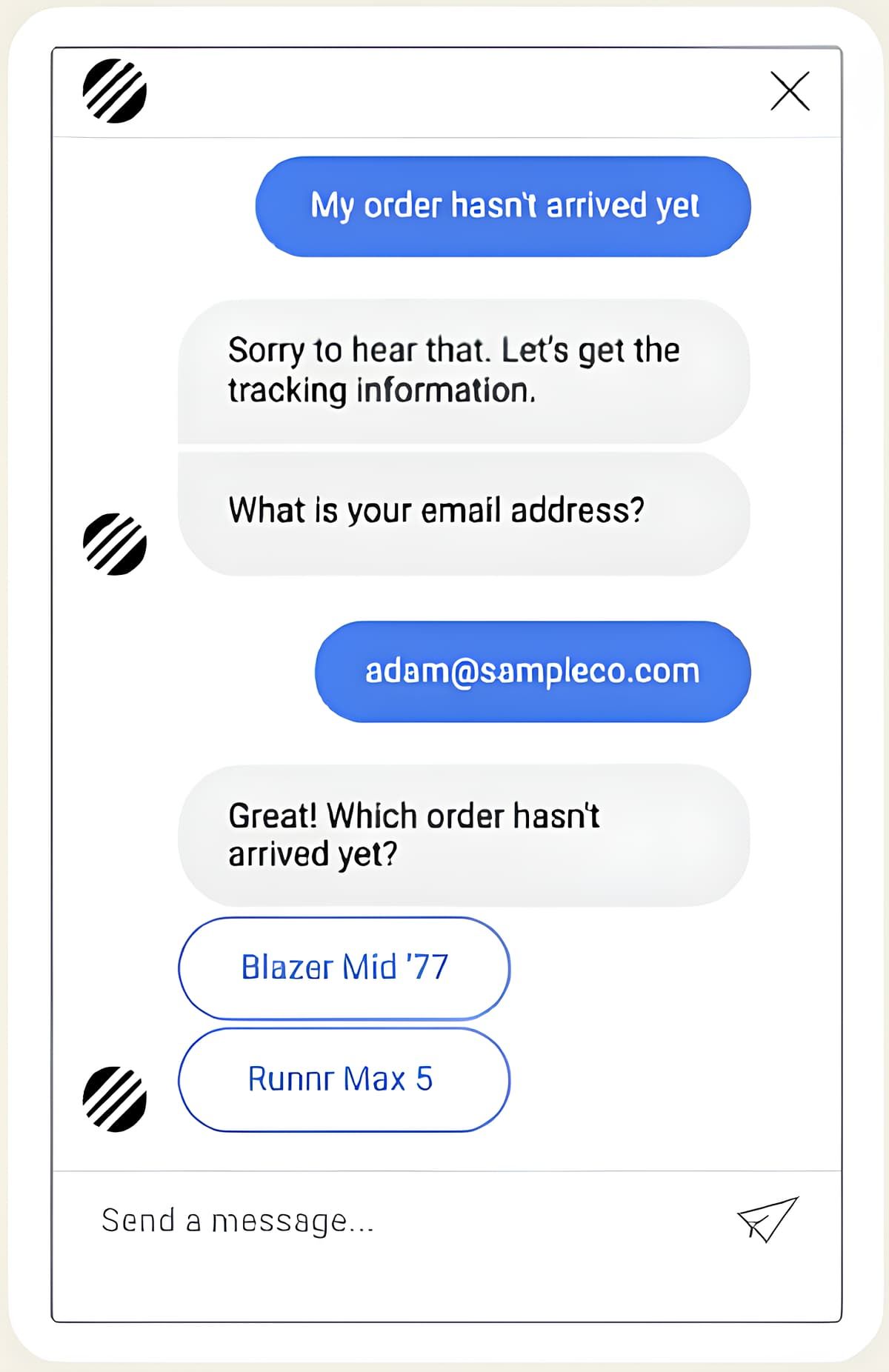
Best for contact center management.
Model : OpenAI and Anthropic
If you’re looking for a reliable next-gen automation platform and AI chatbot, Zoom Virtual Agent should be high on your radar. This AI chatbot offers everything you need to deliver unprecedented customer experiences on demand.
Zoom powers its chatbot with AI and NLP, empowering it to resolve customer queries quickly, efficiently, and accurately at any scale. The chatbot includes a powerful self-service functionality you can rely on to deliver personalized customer service and support across preferred communication channels.
Key features:
- Agent routing;
- Branding and voicing;
- Advanced analytics;
- A/B chatbot testing;
- Data collection;
- Role-based access.
Pricing
- Free – Not available;
- Zoom Virtual Agent pricing information is not available (contact sales).
Pros&Cons
Pros
- Top automated workflows;
- Effective ticket deflection tool;
- Gathers accurate customer insights;
- Excellent self-service tool.
Cons
- Limited capabilities;
- Problem-solving needs more work;
- Frequent bugs.
18. Freshchat
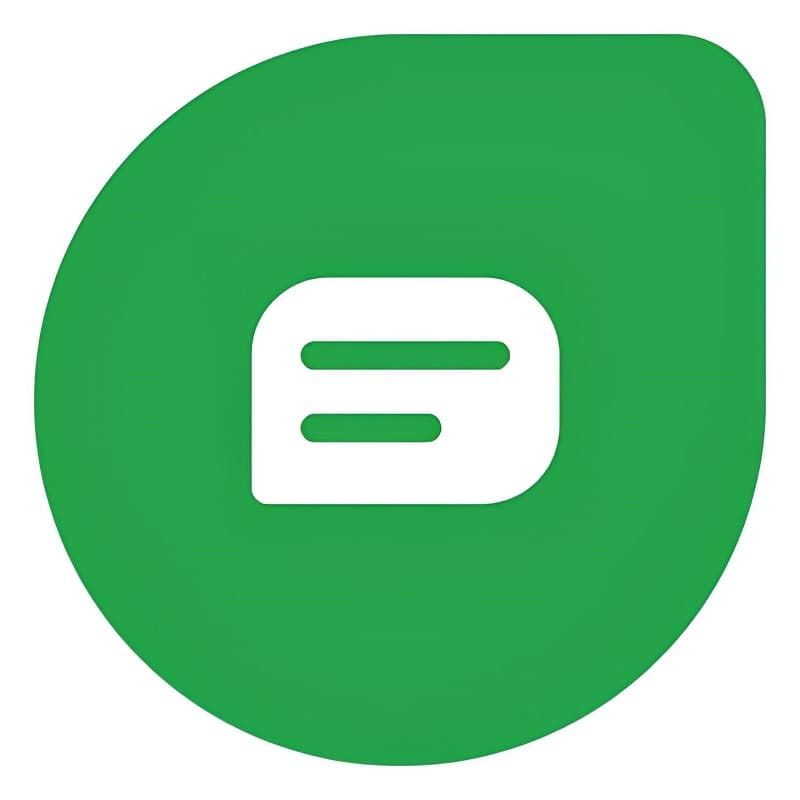
Best for omnichannel customer service.
Model: Information not available
Freshchat is an excellent AI chatbot for delivering fast customer service and real-time support. It can streamline customer support and make your customer service more cost-effective.
With Freshchat, you can store all customer conversations in one place, instantly resolve customer issues, provide automated responses to repetitive questions, offer proactive solutions to real-life problems, and use custom analytics to improve team collaboration and performance.
Key features:
- Multi-channel customer support;
- Digitalized IVRs;
- Automated resolutions;
- Scalable support;
- Contextual agent handovers;
- Support optimization;
- Bot templates;
- Conversation APIs;
- Self-service automation.
Pricing
- Free – $0 for up to 100 agents;
- Freshchat pricing starts at $15 per agent per month.
Pros&Cons
Pros
- Omnichannel communication;
- Free trial;
- Centralized customer support;
- Team collaboration features;
- Automate acquisitions;
- Intent-based responses.
Cons
- Requires Freshworks upgrade to use;
- Limited integration options;
- Chatbot bugs;
- Client issues.
19. ChatSpot

Best for marketing and sales assistance.
Model: OpenAI’s GPT models
Though ChatSpot is still in Alpha, this chatbot is an innovative conversational CRM bot, powered by HubSpot. ChatSpot can perform keyword research for you, gather key analytics from your HubSpot websites, capture leads, research companies, and run advanced reports.
It can also add, update, and create new tasks for your contact center. ChatSpot AI chatbot excels at handling NLP prompts, writing blog articles, and posting them to all available HubSpot platforms.
Key features:
- Assign new contacts;
- Task management;
- Keyword research;
- Content creation;
- Accelerated sales prospecting;
- SEO;
- HubSpot integrations;
- CRM functionality;
- Google Drive, Doc, Slides, and Sheet integrations;
- Follow-up email drafts;
- Advanced reporting.
Pricing
- Free
Pros&Cons
Pros
- Free AI chatbot for sales and marketing;
- Access to the HubSpot CRM;
- As powerful as ChatGPT;
- Rich features;
- Available for HubSpot non-users.
- Compatible with Google Suite.
Cons
- Still in Alpha phase.
20. Boost.ai
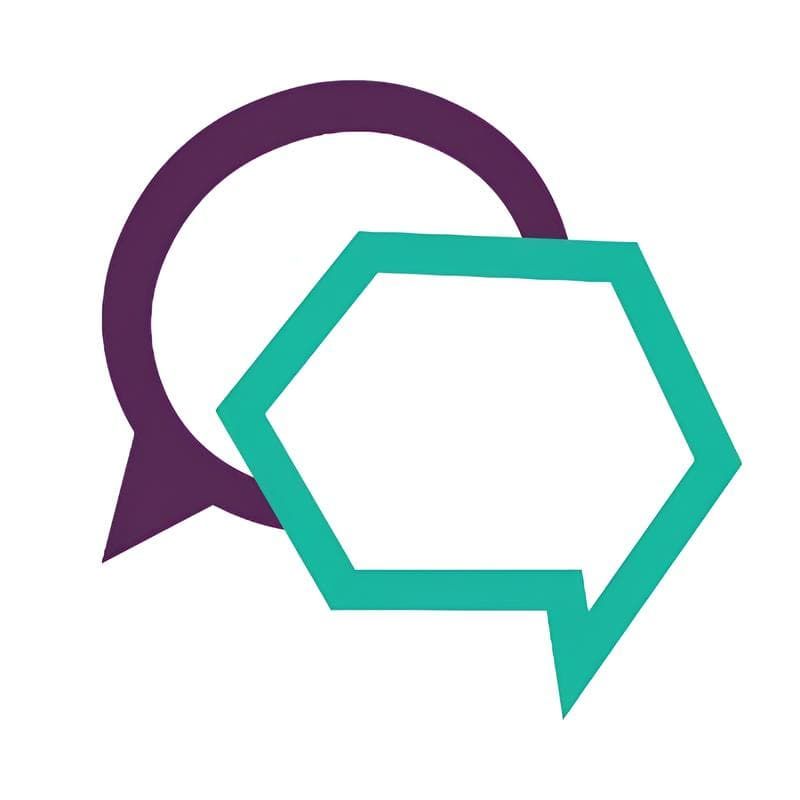
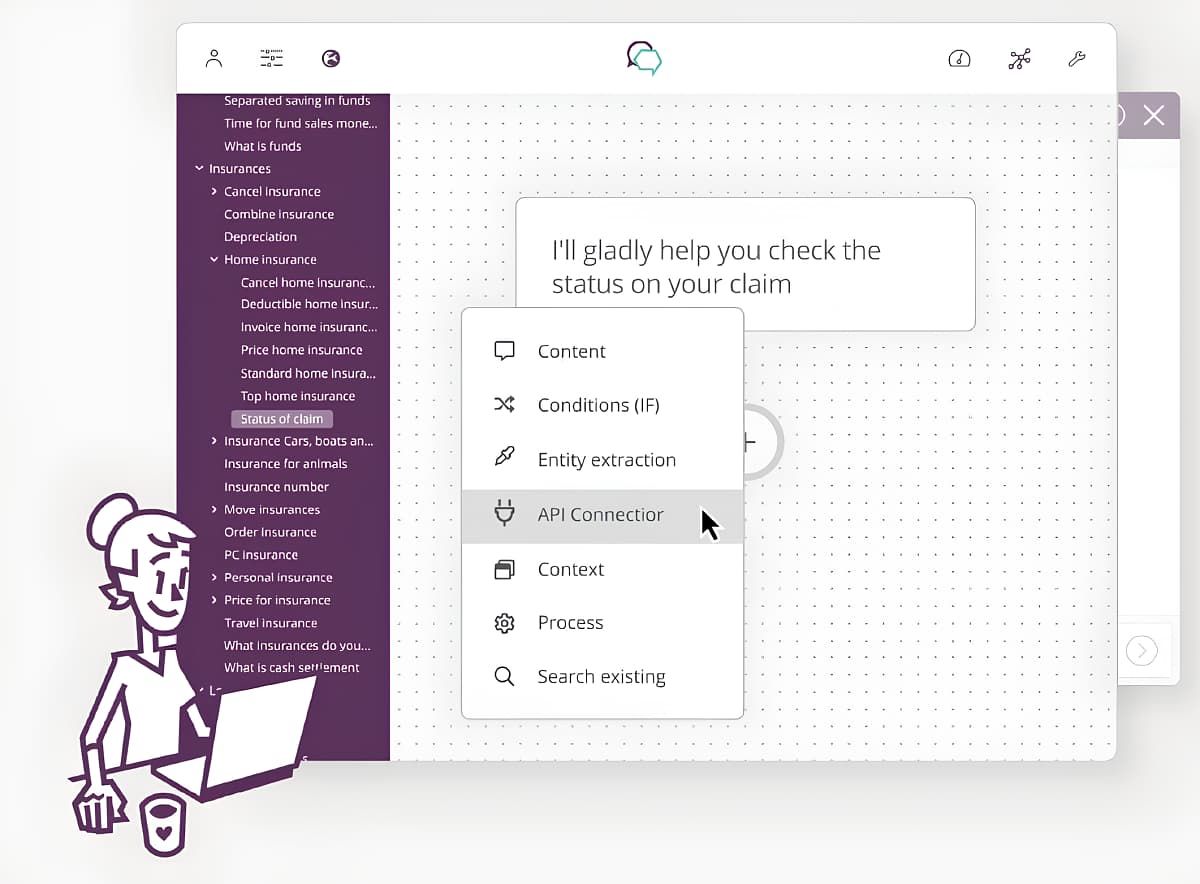
Best for building virtual agents.
Model: NLU and LLM
Boost.ai AI chatbot is the perfect no-code bot platform for transforming your internal support and customer service experiences. This conversational AI bot allows you to build a custom virtual agent that can serve your target audience at any scale.
Boost.ai excels at building operational virtual agents, automating customer service, resolving customer queries, and delivering exceptional customer experiences 24/7/365. It seamlessly integrates with leading platforms like MS Teams, Messenger, Zendesk, and Slack and empowers you to provide 24/7 omnichannel support.
Key features:
- Agent handover summarization;
- Content rewrite;
- Contextual responses;
- Content suggestions;
- Training data for AI models;
- Intuitive AI training;
- Advanced NLU/NLP-driven automation;
- No-code chatbot builder.
Pricing
- Free – Free trial is not available;
- Boost.ai pricing information isn’t available (contact sales).
Pros&Cons
Pros
- User-friendly AI chatbot;
- Perfect for internal support;
- Simplified no-code bot building;
- NLU functionality.
Cons
- No free version;
- Pricing information isn’t available.
21. Forethought

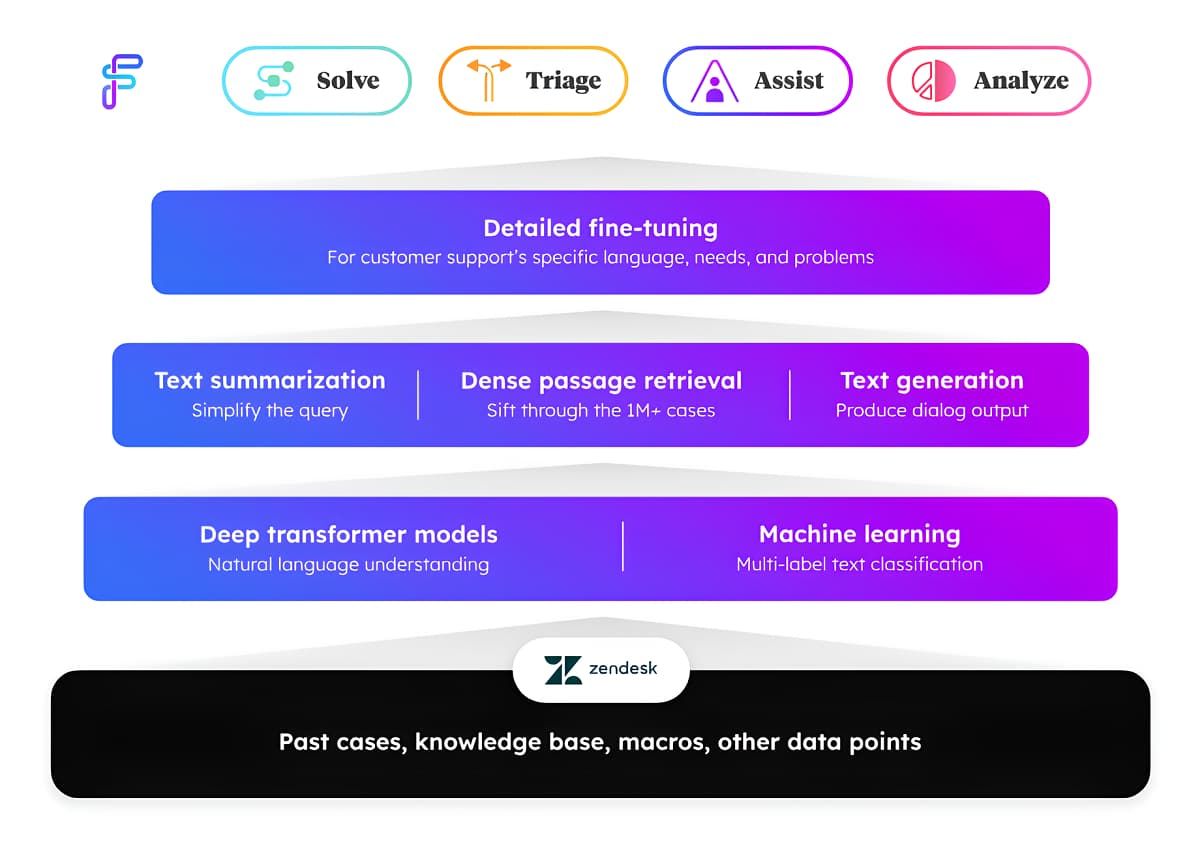
Best for customer support optimization.
Model : SupportGPT
Forethought AI chatbot allows you to harvest the power of generative AI technologies to automate customer service, streamline customer experiences, and maximize ROI and operational efficiency. Forethought built its AI chatbot on LLM models.
Because of that, you can implement the Forethought chatbot in every step of the customer support journey. Forethought solves common problems instantly, prioritizes customer tickets, predicts urgency, and provides agent support with content writing and access to an up-to-date knowledge base.
Key features:
- AI-powered bot builder;
- Omnichannel customer support automation;
- NLU and LLMs;
- Chatbot customization;
- Ticket history;
- Pre-made chatbot responses;
- Intent detection;
- Automated chatbot workflows;
- Triage;
- Ticket deflection.
Pricing
- Free – Free trial isn’t available;
- Forethought Pricing information isn’t available (contact sales).
Pros&Cons
Pros
- Multi-lingual support;
- Reliable generative AI functionality;
- Supports LLMs and NLU;
- Multiple features available from one platform.
Cons
- No free trial;
- Pricing information isn’t available.
22. Thankful

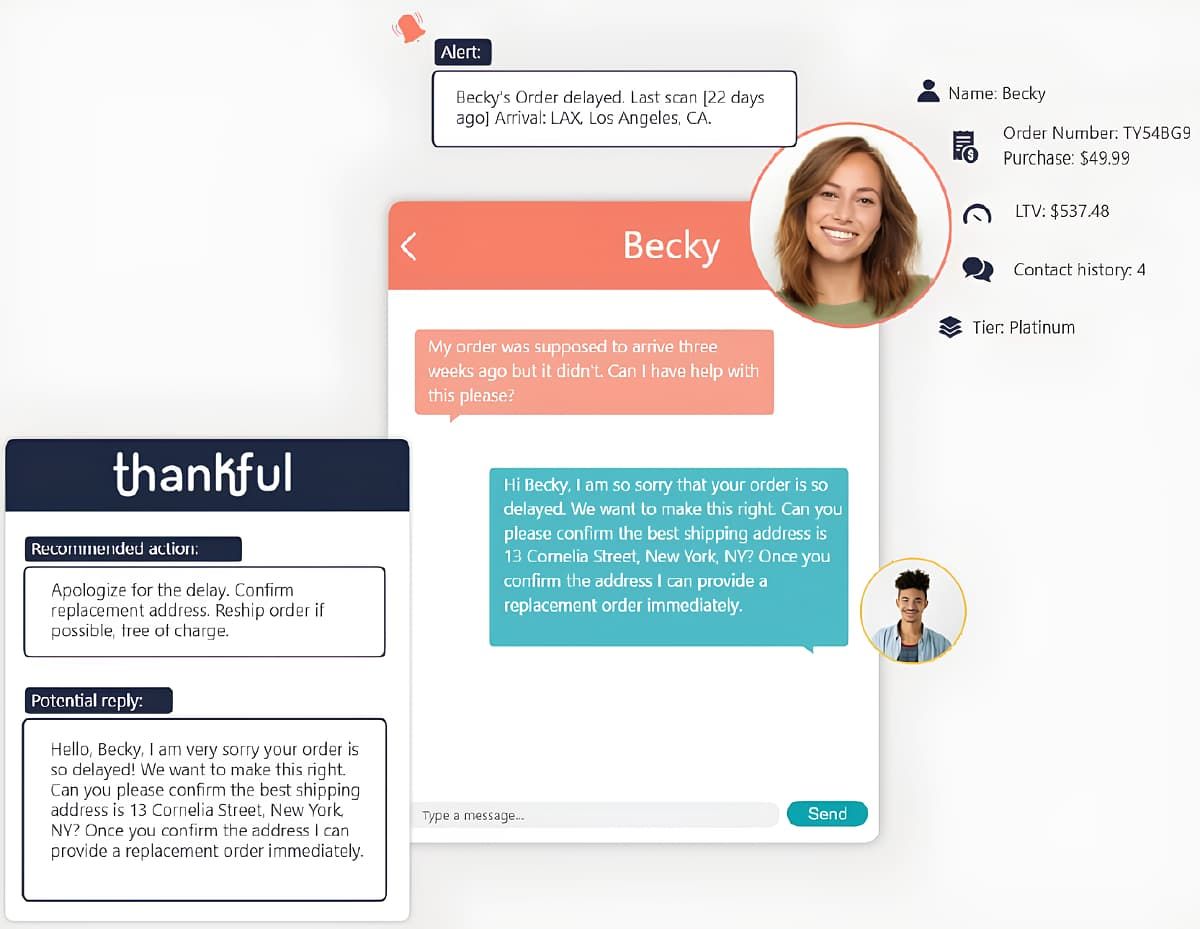
Best for email support and customer service.
Model : GPT-3.5
Thankful AI chatbot is all your customer support agents need and more. This chatbot is perfect for e-commerce platforms as it can handle high volumes of requests across popular communication channels.
Thankful provides multilingual support, translation functionality, agent assistance, and intelligent routing to empower your customer support and increase customer engagement. With Thankful, you can rely on AI-driven bots to handle over 50 common customer questions simultaneously, provide timely answers, and understand the deeper meaning behind customer requests.
Key features:
- Large-scale automation;
- Automated ticket tagging;
- NLP;
- Help desk integration;
- Translation;
- Omnichannel communication;
- Advanced ticketing;
- Personalized responses;
- Support ticket collection.
Pricing
- Free – Free trial isn’t available;
- Thankful pricing information isn’t available (contact sales).
Pros&Cons
Pros
- Advanced customization;
- Ideal for e-commerce and retail;
- Top-grade AI models;
- Flexible service scaling;
- Email support.
Cons
- No free trial or pricing information available;
- Limited functionality.
23. Zowie

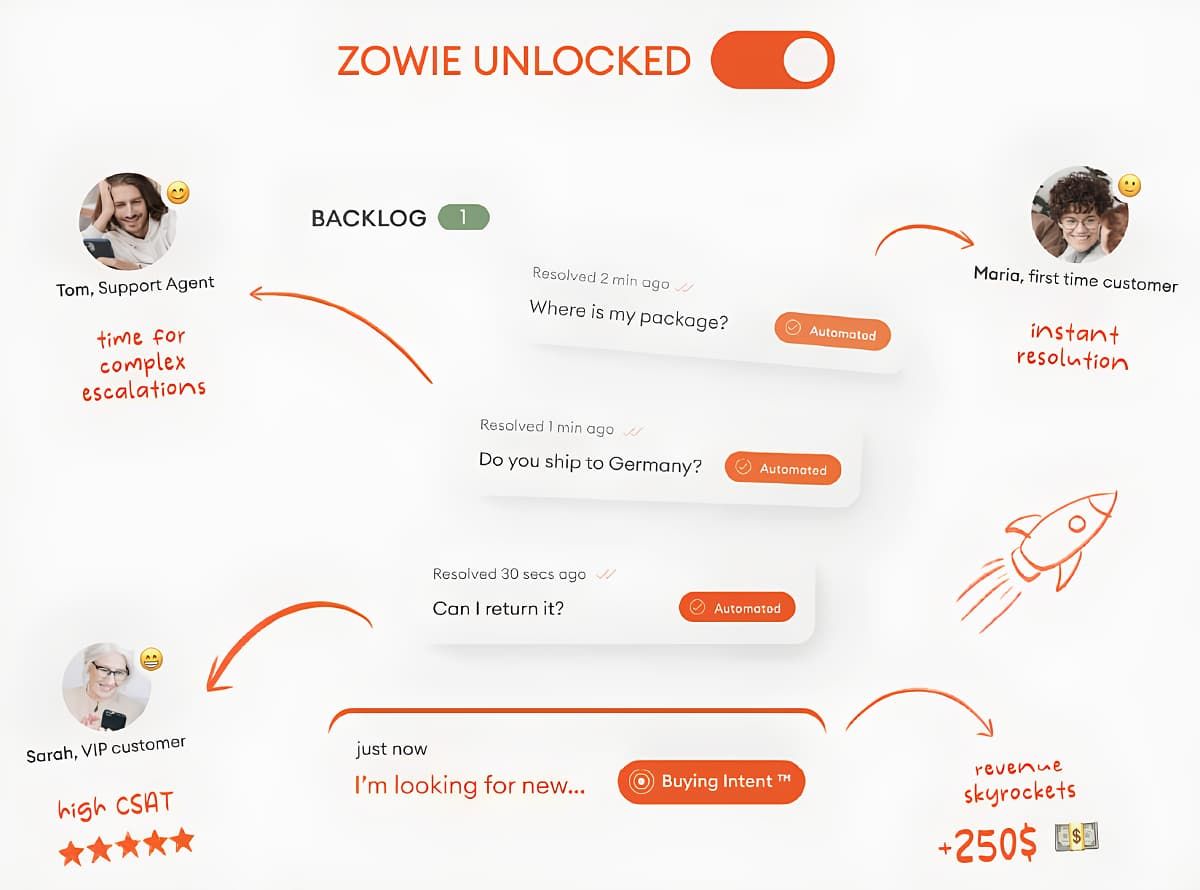
Best for customer service automation.
Model : Zowie X1
Zowie offers a self-learning AI chatbot that uses AI, ML, and public data to train itself to manage customer queries. This chatbot becomes smarter with each interaction and can improve its responses.
These qualities make Zowie AI perfect for e-commerce platforms that leverage automation and intelligent customer service to provide product recommendations, resolve customers’ problems, etc. Zowie relies on AI and ML to resolve issues.
It fetches data from ongoing conversations, FAQ pages, knowledge bases, and historical conversations to improve interactions and offer more robust customer support.
Key features:
- Smart intent detection;
- E-commerce integrations;
- Advanced ticketing engine;
- Streamlined onboarding;
- Omnichannel inbox;
- Historical ticket analysis;
- Customer feedback;
- Ready-to-use templates.
Pricing
- Free – Free trial isn’t available;
- Zowie pricing information isn’t available (contact sales).
Pros&Cons
Pros
- Perfect for e-commerce platforms;
- Easy to use and set up;
- Streamlined chatbot navigation;
- Ideal for onboarding;
- Learns with every interaction.
Cons
- No pricing details or free trial;
- Only as effective as your knowledge base;
- Chatbot bugs.
24. Dixa
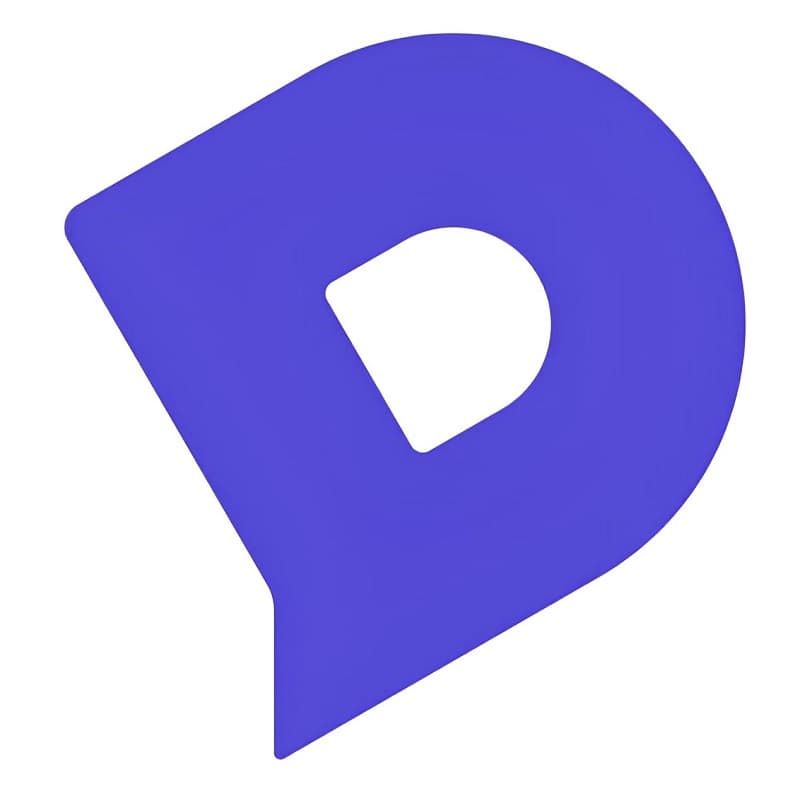
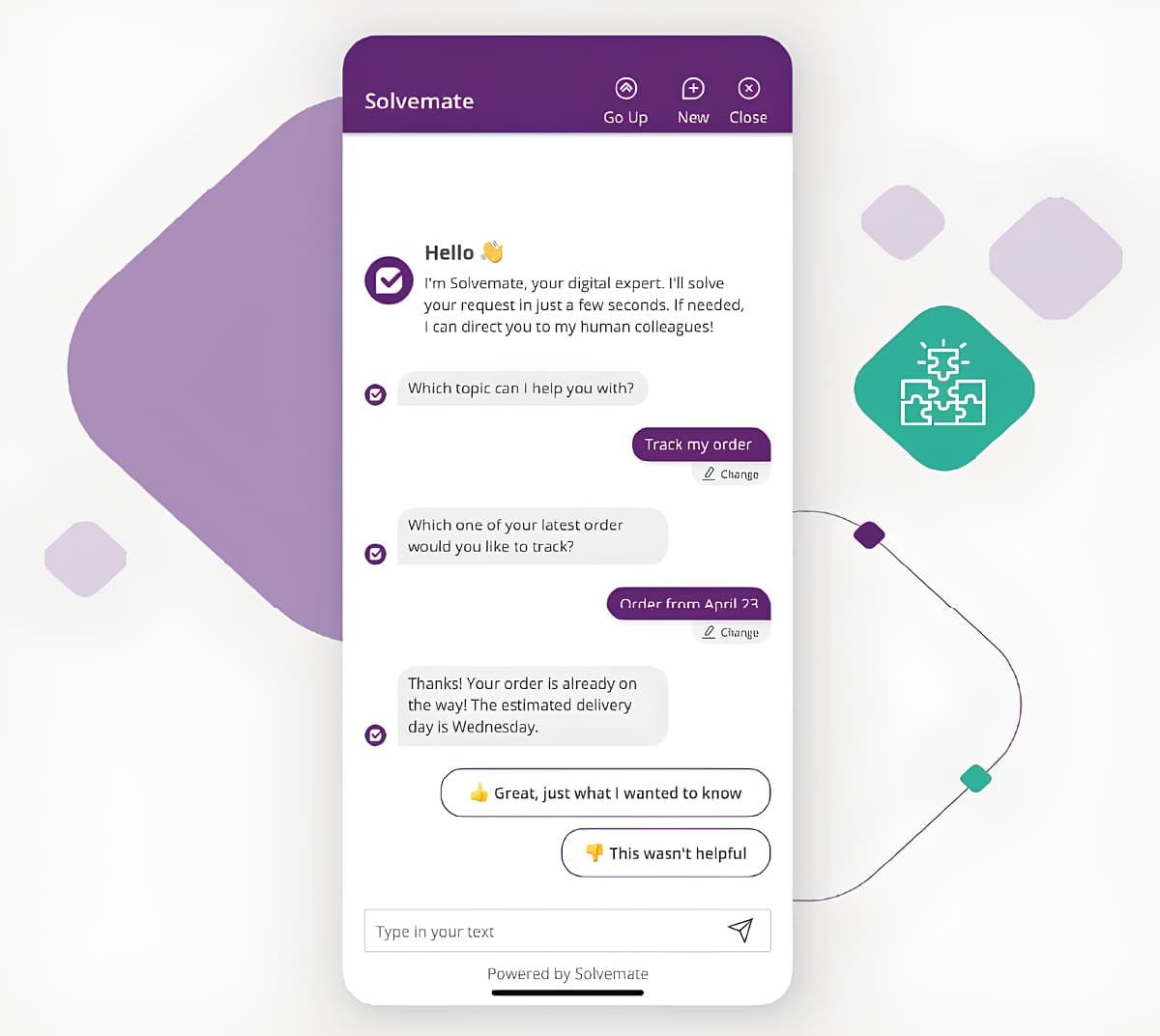
Best for automating customer service queries.
Model : Contextual Conversation Engine, NLP, and dynamic decision trees (DDT)
Dixa’s AI chatbot, Solvemate, is an excellent AI conversational solution for powering up your IT teams, contact center agents, and customer service operations. The chatbot supports various sectors, such as telecommunications, travel, SaaS, financial services, e-commerce, and retail.
Solvemate uses dynamic decision trees (DDT), AI, ML, and NLP to understand your target audience, including the context behind your customers’ queries. By combining NLP-based input and DDT logic, Solvemate can solve issues, handle personalized queries, and cater to your customers across multiple communication channels.
Key features:
- Contextual conversation engine;
- NLP;
- Conversation history;
- Integrations;
- Activity logs;
- Advanced search;
- Intelligent routing;
- Conversational AI;
- Multilingual service;
- Automation builder;
- Ticketing;
- FAQ support.
Pricing
- Free – Free trial isn’t available;
- Dixa pricing starts at $39 per agent per month.
Pros&Cons
Pros
- Ease of use;
- Responsive customer support;
- Advanced AI features;
- 24/7 software availability;
- Top customization options.
Cons
- No free trial;
- Complex to set up;
- Unintuitive bot navigation.
25. Certainly

Best for boosting e-commerce efficiencies.
Model : OpenAI GPT, LLMs, and NLU
Certainly gives you the leading AI-powered chatbot platform that allows sales, marketing, and customer service teams to maximize ROIs, boost efficiencies, and increase customer satisfaction through personalized conversations.
Certainly’s AI chatbot is an ideal tool for your e-commerce website. It can understand your customers, address their needs, solve problems, answer common questions, and cater to your specific business use cases.
Key features:
- E-commerce-focused AI;
- Industry-based knowledge base;
- Conversation history;
- Intelligent product recommendations;
- Support ticket deflection;
- Customer data collection;
- Gamification;
- Contextual understanding;
- NLU;
- No-code template integrations.
Pricing
- Free – Free trial isn’t available;
- Certainly pricing information isn’t available (contact sales).
Pros&Cons
Pros
- Easy setup;
- Responsive customer support;
- Clever recommendations;
- Easy bot building functionality;
- Top integration and customization options.
Cons
- No analytics data;
- Confusing chatbot navigation;
- No free trial or pricing details;
- Some replies seem off.
Which AI chatbot to use?
The best AI chatbot for your business needs depends on many different things. Consider your specific business use cases, available resources, affordable budget, size of operation, and customer service/support needs before making an informed decision.
Here are some factors to include in your calculations:
- The number of daily support queries;
- Task repetition;
- Recurring questions;
- Current customer service efficiency;
- Estimated downtime;
- Current chatbot experience;
- AI capabilities;
- Agent-related waiting times;
- Omnichannel communication capability;
- Level of context you aim for;
- Agent-chatbot correlation.
These factors can give you insights into the best AI chatbot solution for your business. Ideally, you should determine resource gaps that might prevent you from achieving 24/7 omnichannel customer service and support.
Your chatbot should be compatible with as many digital channels as possible, including:
- Popular social media platforms like Twitter, Instagram, Facebook, WhatsApp, Facebook, TikTok, etc.;
- Leading communication platforms like Slack;
- Mobile apps;
- Leading streaming platforms like YouTube;
- Mobile apps;
- Websites.
With all this in mind, opt for an AI chatbot solution that offers all these functionalities.
Top 5 AI chatbots compared
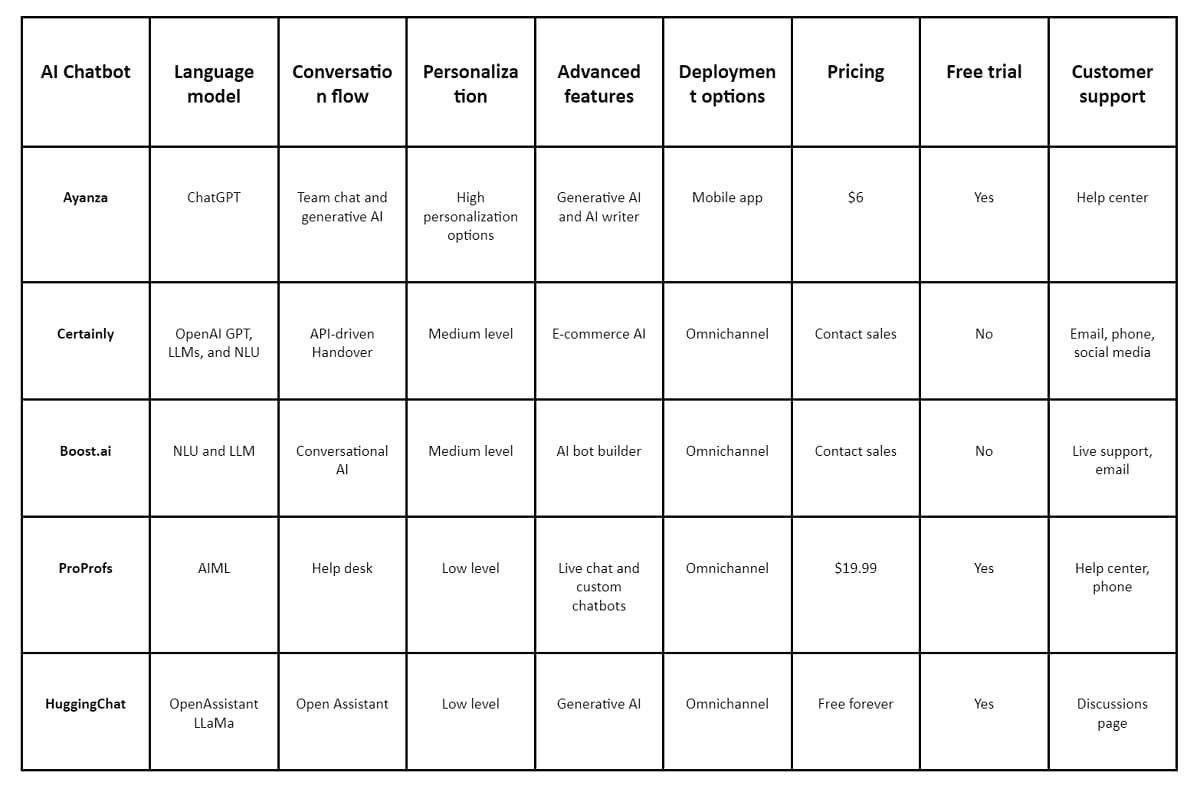
Conclusion
The best AI chatbot for you is the one that caters to all your needs – it all comes down to what you want to use the AI chatbot for. Since each AI chatbot offers unique features, consider the extra features, pricing, language model, and customization options.
Out of the 25 AI chatbot solutions listed here, the Ayanza AI chatbot seems like the most viable and affordable option. It offers a free trial, advanced AI functionalities, separate team collaboration channels, mobile deployment, and top personalization options.
These qualities can become quite useful when scaling your operations and expanding your business into new territories.
FAQ
Which AI is used for chatbots?
Most AI chatbots use conversational AI models, such as OpenAI GPT 3.5 and GPT-4 language models. However, not all chatbots use conversational AI. For example, rule-based bots rely on various language identities like keywords and phrases to generate replies.
What are the different types of AI chatbots available?
Two main types of AI chatbots include Generative AI and Conversational AI. AI chatbots can also fall into two categories:
- Task-oriented chatbots – these bots use ML, NLP, and other technologies to create automated replies to user requests.
- Data-driven, predictive chatbots – also known as digital or virtual assistants, these bots are more personalized, interactive, and advanced than task-oriented bots.
Like task-oriented chatbots, predictive bots also use AI, ML, and NLP to learn on the go. However, they are more contextually aware due to access to NLU models. NLU makes predictive bots more intuitive, predictive, and accurate.
Can an AI chatbot handle complex queries or tasks?
AI chatbots can leverage automation to handle multiple customer requests simultaneously. If an AI bot runs into an issue too complex for it to solve, it will use intelligent routing to transfer the query to a suitable human agent.
Though they are powerful, AI chatbots aren’t perfect. They can’t replicate genuine empathetic understanding and emotional intelligence.
Is it possible to customize the appearance and personality of an AI chatbot?
You can customize the personality and appearance of your AI bot using pre-made chatbot templates and training models.
However, before you customize and personalize your bot, there are a few important considerations to mention:
- The purpose of your AI chatbot;
- Your target audience;
- Your chatbot name;
- Empathy and emotions;
- Handling unexpected situations.
These considerations will help you turn your AI chatbot into a customer service and support powerhouse, capable of intelligently understanding customer interactions and the intent of your customer’s needs.
How can an AI chatbot contribute to team collaboration and productivity?
AI chatbots like Ayanza operate as intelligent knowledge bases that make relevant project-related information always available and accessible. You can see them as AI-powered knowledge repositories that can organize data and make it steadily available to your team.
Your team can query chatbots to receive brainstorming ideas, content suggestions, guidelines, policies, and relevant documents for the project at hand. That helps your team members minimize time wasted on looking for data manually.
In addition, AI chatbots provide omnichannel communication experiences to keep your team aligned on ongoing tasks, common goals, and project deadlines.
💡 Get inspired on how to secure proper AI tools for use cases other than just chatbots
AI-based knowledge management systems

